- Home
- Ann M. Martin
Mallory and the Mystery Diary Page 3
Mallory and the Mystery Diary Read online
Page 3
“Am not!” cried Suzi indignantly.
“Are too!”
“Am not!”
“Are too!”
“Can it, you guys,” Dawn called. “Marnie and I will be there in a minute. Just as soon as she finishes her milk.” (We have all learned that it is not a good idea to let Marnie eat or drink anything in a room with a rug on the floor.)
When Marnie’s cup was empty, Dawn led her downstairs (a slow process). She was greeted by the sight of Buddy and Suzi sitting scrunched up at opposite ends of the couch, purposefully ignoring each other. Their heads were turned away from one another and their arms were crossed.
“All right,” said Dawn. “I don’t know what’s going on, but stop it. Suzi, would you like to be my big helper today?”
“Sure!”
“Good. Why don’t you and Marnie build something with blocks. I’m going to give Buddy a hand with his reading.”
“You are?” said Buddy in astonishment.
“Yup.”
“Do you promise — no flash cards?”
“Cross my heart,” replied Dawn solemnly.
“Well … okay.”
Suzi and Marnie settled themselves at one end of the rec room. They dumped out a big carton of wooden blocks and turned Sesame Street on low. At the other end of the room, Dawn sat Buddy next to her. She held a copy of Green Eggs and Ham in her lap.
“Here,” she said to Buddy. “Try reading this.”
Buddy made a face but opened the book to the first page. “‘I … am … same,’” he read slowly.
“No, no,” interrupted Dawn. “Not ‘same.’ It’s ‘Sam.’ See? It’s that funny guy’s name.”
Buddy nodded. He turned the page. The words were repeated. “‘I … am … Sa — Sam,’” he corrected himself.
“Good!” exclaimed Dawn.
Next page. “‘Sam … I am.’”
“Great!”
Next page. Nothing. Buddy didn’t open his mouth.
“Go ahead,” said Dawn.
“No. This is too hard.”
“Okay, I’ll read a few pages.” Dawn read up to page nineteen. Then she gave the book back to Buddy. “Now you try again.”
“‘Wuh-wuh —’”
“Would,” supplied Dawn.
“‘Would … you like … them … in a …’”
Buddy paused.
“House!” cried Suzi. She had crept to the couch and was peering over Buddy’s shoulder. “I know that word. We learned it in kindergarten. And that word is ‘mouse’!”
With that, Buddy slammed the book shut. He stuffed it between the cushions of the couch. “I hate this old book anyway,” he announced. “It’s for babies and it’s boring.”
“It is not for babies!” squawked Suzi, insulted.
“Yes, it is.”
“Okay, okay,” said Dawn. “Enough reading. And enough fighting,” she added. “Suzi, you go help Marnie again. Buddy, the rain has stopped. Why don’t you take Pow out in the backyard and give him some exercise?”
Dawn knew Buddy needed to escape. She also knew he needed help — lots of it — with his reading. And by the time Mrs. Barrett came home, she had an idea.
She waited until she was alone at the front door with Buddy’s mother. Then she said, “I was reading a little with Buddy today and I think he is having some problems. I was just wondering — would you like somebody in the Baby-sitters Club to tutor Buddy? I mean, spend a few hours a week working alone with him? Maybe he just needs some special attention.”
“Oh, Dawn, that would be wonderful. You’re a lifesaver. As always,” said Mrs. Barrett.
Dawn grinned. “I’ll have to wait until our next club meeting so we can see who could fit something like that into her schedule. I’ll call you tomorrow, okay?”
“Okay!” Mrs. Barrett looked very relieved, and Dawn felt quite proud of herself.
Monday and Tuesday had passed. So had Wednesday and Thursday. Now, on Friday afternoon, we still hadn’t opened the trunk. It was another drizzly day. I had nothing to do until our BSC meeting at five-thirty. Vanessa and I were sitting on my bed, staring at the trunk. We were on my bed because Vanessa’s was littered with half-finished poems and there was no room for her.
Suddenly Vanessa jumped up and cried, “I can’t stand it any longer! That trunk is driving me crazy. We’ve got to open it. Now!”
“But we can’t,” I replied. “We’ve tried everything. And I don’t want to break it.”
“So you’re going to let it sit here locked up forever, and never get to see what’s in it?”
That did seem sort of silly. But all I said was, “I don’t want to ruin it.”
Vanessa looked thoughtful. Then she said, “If you do not open that trunk, then I will be in a big, bad funk.”
“Are you going to start talking in rhymes again?” I asked warily.
“Probably.”
I ran to our doorway. “Byron! Jordan! Adam! Come quick! And bring a hammer and a wrench!”
I absolutely cannot stand it when Vanessa speaks in rhymes. I’d do anything to prevent it. Even break the locks on the beautiful trunk.
A few moments later the triplets arrived with the tools.
“What is it?” asked Adam. “What are you doing?”
I pointed to the trunk. “Open it,” I commanded. “Break the locks.”
“All right!” exclaimed Jordan.
The boys attacked the locks. I squinched my eyes shut. I couldn’t bear to look. I heard pounding and smashing and grunting. I heard Byron say, “I’ll go get the crowbar.” (Oh, no. Not that, I thought.) At last I heard a skreek, and Vanessa cried, “It’s open! It’s open!”
I dared to peek. The trunk was in better shape than I’d expected. Except for the fact that the locks were just barely hanging onto the lid, the trunk looked okay.
Vanessa was already digging into it.
“Look! Look!” she was crying. “Clothes! They’re … they’re gorgeous. I bet they’re antiques.”
“Be careful with them, then,” I said. I peered into the trunk. I saw mounds of old, white, lacy petticoats and dresses and blouses. They were all handsewn. And Vanessa was right. They were probably antiques. “They look awfully fragile,” I added.
Vanessa nodded. She was already handling them more delicately.
“Thanks, you g —” I started to say to the triplets, but they were heading down the hall, muttering things like, “Boring,” and, “All that work for a bunch of old clothes.”
Vanessa and I carefully lifted the clothes out of the trunk, one by one. We hadn’t even finished when Vanessa began trying things on. Most of the clothes were in girls’ sizes. But I kept emptying the trunk. I had a funny feeling that something else would be in it besides clothes.
I almost decided I was wrong, though: I didn’t find the diary until I’d reached the very bottom of the trunk.
“Ooh,” I said under my breath. “Look at this.” But Vanessa was too busy looking at herself in the mirror.
I sat on the edge of my bed and opened the diary. The first page read, “This is my book, by Sophie. And this is a year in my life — 1894.”
“Eighteen ninety-four,” I said, awed. “That’s ages and ages ago.”
“Huh?” said Vanessa, but I could tell she wasn’t really interested.
I turned to the next page. It was headed January 1, 1894. Underneath was a whole page in Sophie’s handwriting. It wasn’t easy to read. She made her letters oddly — all sprawled out, she wasn’t the world’s best speller, and the ink was faded. But of course I began reading right away. I didn’t even feel guilty. I would have felt horribly guilty sneaking a peek at a friend’s diary, but Sophie said on the first page that she was twelve years old, so I figured she wasn’t alive anymore. If she were, she’d be over a hundred. This wasn’t prying — it was history.
As I read, I thought how lucky I was. I mean, just to be reading. When you read, you can sit in your room and travel back and forth in ti
me, or to other countries, or to made-up lands, or to outer space. And all without moving a muscle, except to turn pages. I thought about Buddy Barrett. It was going to be my job to help turn him into a reader. I was going to be his tutor. Mrs. Barrett and I had agreed that we would try a few sessions (Tuesdays and Thursdays from four until six) to see how things went.
I wanted them to go well. I wanted Buddy to like reading as much as I did.
“How do I look?” spoke up Vanessa. She turned away from the mirror. She was completely dressed in white — with a lot of lace. She was wearing a white dress over two white petticoats. On her hands were white lace gloves. But on her feet were black shoes with about a million buttons on them.
“Where did those come from?” I asked, pointing to the shoes.
“On the bottom. Over to one side. They were with all that stuff.”
I opened my eyes wide. On Vanessa’s messy bed were several hats, a book, and two small boxes. I must have missed them because I’d been so engrossed when I found the diary.
“What are these things?” I asked, rushing for them.
“Don’t know,” replied Vanessa. She was gazing at herself in the mirror again. I had to admit that she looked uncannily like someone from another century. And I could almost see poetry forming in her head.
I shoved aside some of Vanessa’s crumpled papers, sat on her bed, and opened the book. I was hoping for another year in the life of Sophie. But there were no words in the book at all, just pressed flowers. They were so crumbly and faded that they were hard to identify, but I thought that some of them might be pansies and others, violets.
I put the book down and gingerly opened one of the boxes. Inside was a pearl brooch (well, it might not have been made from real pearls) edged in gold.
“Ooh, Vanessa,” I said. “Put this on. Isn’t it pretty?”
Vanessa’s eyes lit up.
“See? It goes right here on the collar of the blouse, at your throat.”
I pinned the brooch on Vanessa and thought she would die of happiness. Then she tried on the hats while I opened the second box. It contained a different brooch, which I handed over to Vanessa.
“Who do you think all these things belonged to?” she asked dreamily, switching brooches.
“Sophie,” I replied, just as dreamily.
“Who’s she?”
“A girl who lived in the eighteen hundreds. She was born in eighteen eighty-two. Probably right in Stacey’s house. I found her diary in the trunk.”
“Gosh,” was all Vanessa could say.
“Can you imagine living way back then?” I asked.
“And dressing like this every day?” added Vanessa.
“Maybe you didn’t dress like that every day.”
“Maybe you did if you were rich. Was Sophie rich?”
“I don’t know. I haven’t found that out yet.”
“Stacey’s house is nice, but it’s not a mansion. I mean, it doesn’t seem like a house for a very rich family,” mused Vanessa.
“No, you’re right,” I agreed.
Vanessa turned back to the mirror, and I turned back to the diary. I opened it again and began to read the January 1st entry. But I closed the book. I decided I wanted to save it for good bedtime reading one night.
Instead, inspired by Sophie, I opened my own journal and began to write in it:
I stopped writing. I had just looked at the clock. Five-fifteen! I had to get to Claud’s right away! I hid my journal (Vanessa never even noticed), ran downstairs, and hopped on my bike. Boy, did I have news for my friends!
I tried to be optimistic in my journal, but I was feeling a little discouraged. I knew it wouldn’t be my fault if I didn’t turn Buddy into a reader, but I like good challenges and I don’t like failing at them. Besides, I like Buddy, too, and I certainly didn’t want to fail him.
My first session with Buddy fell on an afternoon when Mrs. Barrett had to work, but she was taking his reading problem quite seriously (even if she couldn’t spend extra quality time with him), and had arranged for Jessi to baby-sit Suzi and Marnie, so that Buddy could have me to himself.
Jessi and I talked about the afternoon’s arrangements on the playground at school that day.
“I think it’s good that I get there first,” said Jessi. “I’m supposed to arrive at three-thirty, right after school.”
“And I don’t arrive until four,” I said. “Yeah, that is good. It’ll be clear that you’re the baby-sitter and I’m the tutor.”
“You should probably work in Buddy’s room at his desk with the door closed.”
“Right,” I agreed. “That’ll be like school. Maybe Buddy needs help with things like concentrating and sitting still. A quiet room with a desk should be good.”
Our plans were made. I was sure that tutoring would be a snap. Sometimes I play spelling and writing games with Claire. She’s always an eager student. So promptly at four that afternoon I rang the Barretts’ bell, feeling excited. Inside, I could hear Jessi call, “Buddy, there’s Mallory. That’s for you. Can you answer the door, please?”
I was standing on the Barretts’ steps, all smiles, ready to introduce Buddy to the wonderful world of reading.
But the door was opened by a boy with a scowl so big that my smile faded immediately. I tried to appear bright and perky, though.
“Hiya, Buddy,” I said. “Are you ready to get to work?”
“No,” he replied sullenly. “I just got home from school. I don’t want to do more work.”
But he let me in anyway.
I walked inside, called hello to Jessi and the girls, whom I could see in the kitchen, and led Buddy upstairs and into his room.
We closed the door.
“Now,” I began, “first of all, we’re going to sit at your desk, just like in school.”
“You don’t sit at my desk in school,” said Buddy.
“Well, you do,” I replied, “and I’m going to pull up your other chair and sit next to you. You can pretend I’m your teacher. Who’s your teacher?”
“Mr. Moser. I hate him.”
“Oh. Well, I guess I don’t look much like him anyway. I’ll just be Mallory then.”
Buddy shrugged his shoulders as if to say, “Whatever. I don’t care.”
“Okay,” I went on. “Your mom said your teacher sent home a box of flash cards. Let’s start with those.”
Buddy groaned. “I hate flash cards. Almost as much as I hate Mr. Moser.”
“Well, let’s try them anyway. Where are they?”
Buddy slapped his hand to his forehead. “Darn!” he cried. “I forgot and left them downstairs.” He flew out of the room and took a long time coming back. But at last he returned with the flash cards.
“Here they are,” he said grimly.
I opened the box.
“Oh, wait!” cried Buddy. “I forgot something else, too. I — I need a drink of water.”
I let Buddy leave to get some water. He must be a camel. He was gone for an awfully long time.
When he returned, I resolutely closed the door to his room, cleared his desk of toys, sat him in the chair, and pulled the other chair up next to him.
I opened the box of flash cards. As I did so, I got an idea. I remembered the movie Mary Poppins, and how Jane and Michael’s wonderful, magical nanny would make fun games out of boring things.
“Buddy,” I said, “as we go through these flash cards, we’ll put the words you know right away in one pile, and the hard words in another pile. For all the words you know — or learn today — I’ll give you a minute of free time at the end of the afternoon, okay?”
Buddy looked mildy interested. “Okay,” he agreed.
The cards in the box were all mixed up. On some were easy, short words. On others were hard, longer words.
I held up the first card.
“Easy,” said Buddy. “‘At.’”
“Good. One minute of free time.” I laid the card on the table and held up the second one.
> Buddy stared at it. “‘Check’?” he guessed.
“Almost. The word is ‘chicken.’” I laid it next to the first card.
“Do I lose my minute?” asked Buddy, dismayed.
“No, you just don’t get a second one yet. That’s all.”
“Oh.” Buddy still looked disappointed.
“Try this one,” I said, showing him the next card.
“Ball,” said Buddy. “Simple.”
“Good. Now you have two free minutes.”
We worked our way through about half the deck of cards. Buddy began to slump in his chair. He sat with one hand under his chin, as if his head might drop off if he didn’t support it.
“Mallory,” he whined, “I hate these cards. They’re stupid. Sometimes I don’t know a word all by itself, but if I see it in a book with a lot of other words around it, then I can figure it out.” (Well, that made sense.) “Besides, look at the piles. There’s a huge one of words I didn’t get right away. The other pile is short. How many free minutes did I earn?”
I counted the cards in the small pile. “Seven,” I told him.
“Seven! That’s nothing.”
Buddy looked like he was going to cry, so I put the cards back in their box. “I guess we’ve spent enough time on flash cards. Do you have any homework?”
Buddy nodded. He told me what it was.
“Then how about reading in your reading book and doing the homework pages in your workbook?”
Buddy let out a huge sigh. Then he slapped his hand to his forehead again. “Darn! I forgot my reading book. I left it downstairs, too. I’ll have to go get it.”
“While you’re at it, get your workbook,” I said slyly. I just knew Buddy would “forget” it otherwise, and have to make yet another trip downstairs.
Buddy left, took his time finding the books, but finally returned with them. He was scowling again.
I ignored the scowl. “What did you say your workbook pages are?” I asked him.
“Sixty-seven and sixty-eight.”
“Okay. Open to page sixty-seven.”
Buddy did so.
“Now read the instructions out loud.”
“Mallory,” said Buddy, “I am not Cinderella. You can’t order me around.”

 Karen's Tea Party
Karen's Tea Party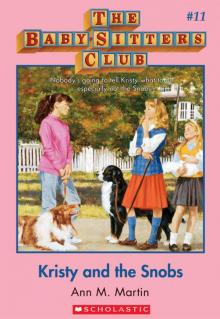 Kristy and the Snobs
Kristy and the Snobs Best Kept Secret
Best Kept Secret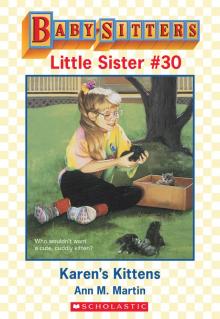 Karen's Kittens
Karen's Kittens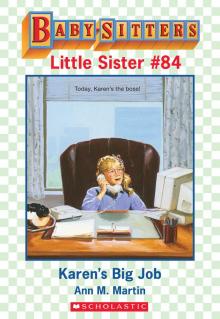 Karen's Big Job
Karen's Big Job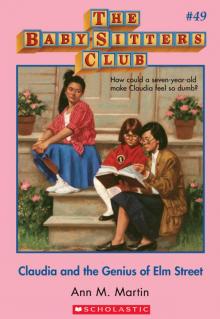 Claudia and the Genius of Elm Street
Claudia and the Genius of Elm Street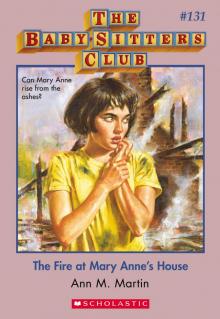 The Fire at Mary Anne's House
The Fire at Mary Anne's House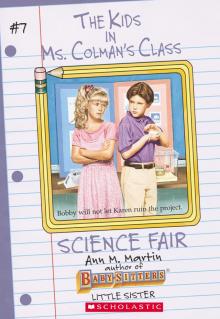 Science Fair
Science Fair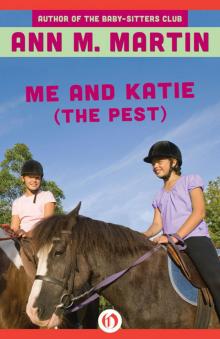 Me and Katie (The Pest)
Me and Katie (The Pest)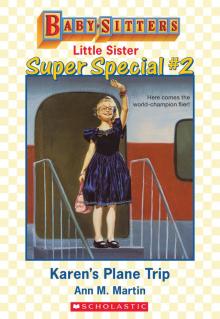 Karen's Plane Trip
Karen's Plane Trip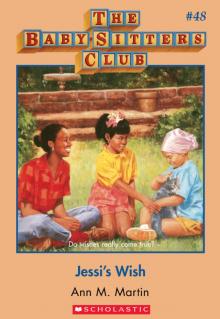 Jessi's Wish
Jessi's Wish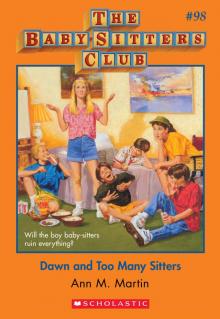 Dawn and Too Many Sitters
Dawn and Too Many Sitters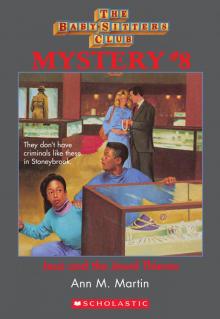 Jessi and the Jewel Thieves
Jessi and the Jewel Thieves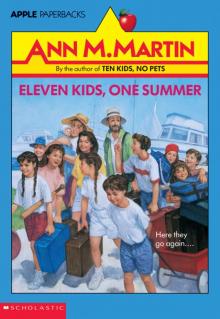 Eleven Kids, One Summer
Eleven Kids, One Summer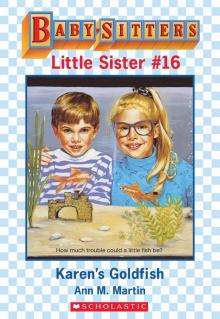 Karen's Goldfish
Karen's Goldfish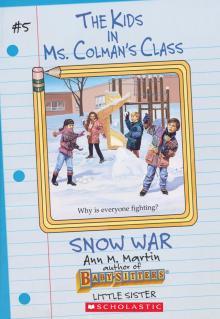 Snow War
Snow War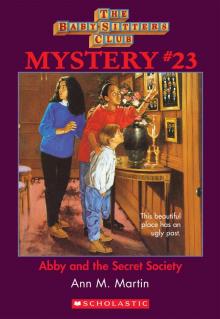 Abby and the Secret Society
Abby and the Secret Society Keeping Secrets
Keeping Secrets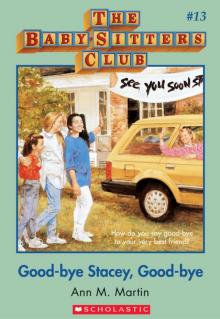 Good-Bye Stacey, Good-Bye
Good-Bye Stacey, Good-Bye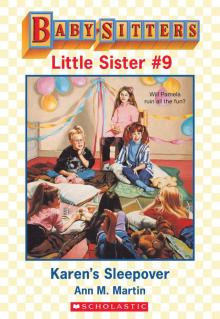 Karen's Sleepover
Karen's Sleepover Claudia and the World's Cutest Baby
Claudia and the World's Cutest Baby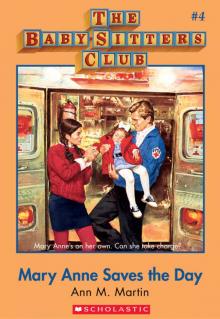 Mary Anne Saves the Day
Mary Anne Saves the Day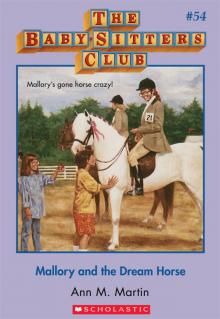 Mallory and the Dream Horse
Mallory and the Dream Horse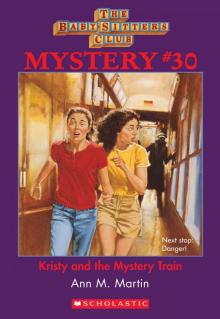 Kristy and the Mystery Train
Kristy and the Mystery Train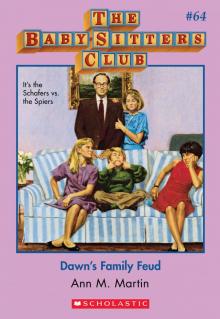 Dawn's Family Feud
Dawn's Family Feud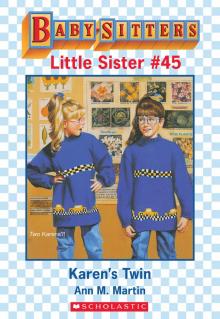 Karen's Twin
Karen's Twin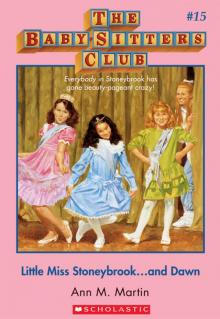 Little Miss Stoneybrook... And Dawn
Little Miss Stoneybrook... And Dawn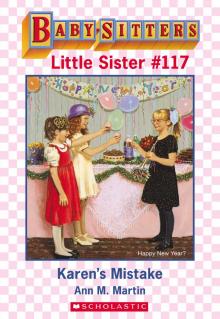 Karen's Mistake
Karen's Mistake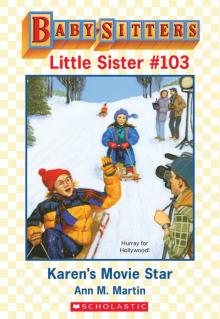 Karen's Movie Star
Karen's Movie Star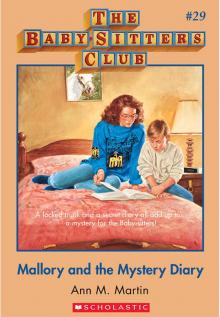 Mallory and the Mystery Diary
Mallory and the Mystery Diary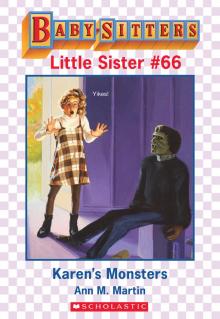 Karen's Monsters
Karen's Monsters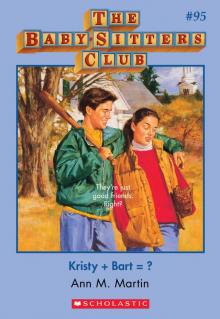 Kristy + Bart = ?
Kristy + Bart = ?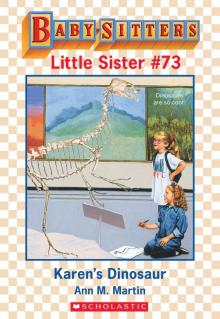 Karen's Dinosaur
Karen's Dinosaur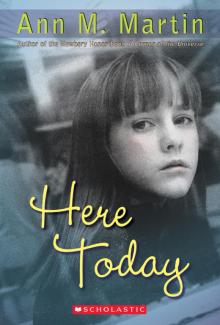 Here Today
Here Today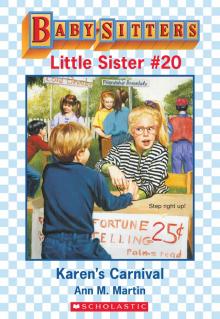 Karen's Carnival
Karen's Carnival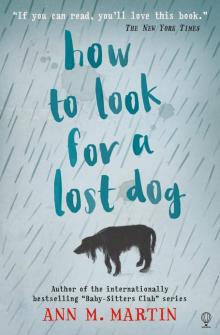 How to Look for a Lost Dog
How to Look for a Lost Dog Stacey vs. Claudia
Stacey vs. Claudia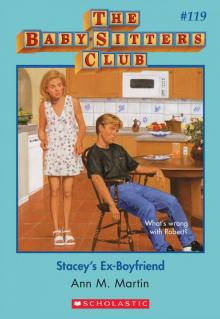 Stacey's Ex-Boyfriend
Stacey's Ex-Boyfriend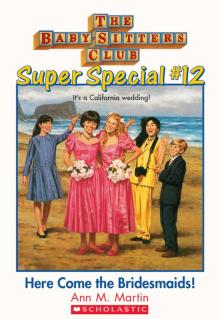 Here Come the Bridesmaids!
Here Come the Bridesmaids! Graduation Day
Graduation Day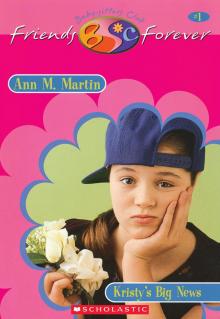 Kristy's Big News
Kristy's Big News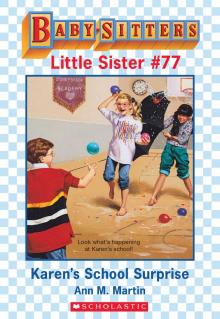 Karen's School Surprise
Karen's School Surprise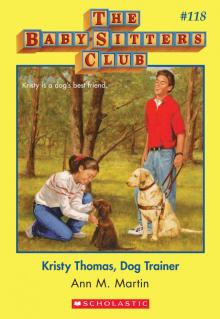 Kristy Thomas, Dog Trainer
Kristy Thomas, Dog Trainer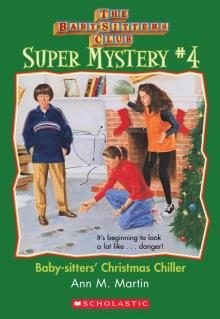 Baby-Sitters' Christmas Chiller
Baby-Sitters' Christmas Chiller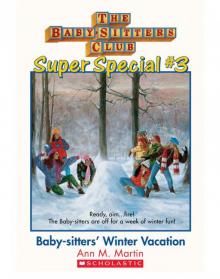 Baby-Sitters' Winter Vacation
Baby-Sitters' Winter Vacation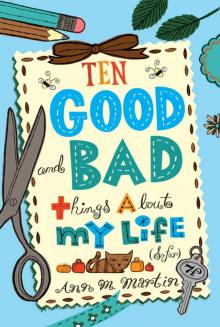 Ten Good and Bad Things About My Life
Ten Good and Bad Things About My Life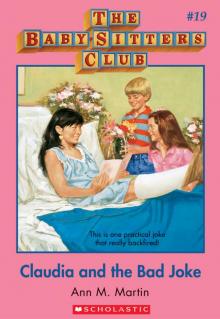 Claudia and the Bad Joke
Claudia and the Bad Joke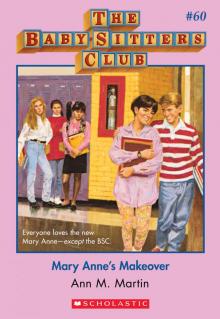 Mary Anne's Makeover
Mary Anne's Makeover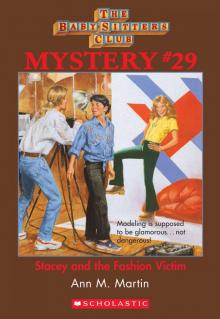 Stacey and the Fashion Victim
Stacey and the Fashion Victim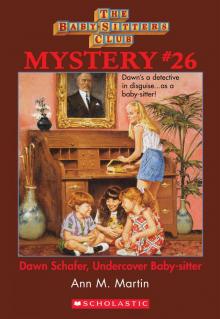 Dawn Schafer, Undercover Baby-Sitter
Dawn Schafer, Undercover Baby-Sitter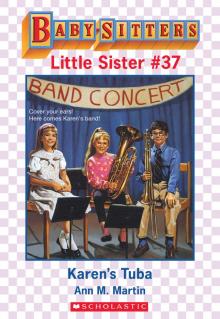 Karen's Tuba
Karen's Tuba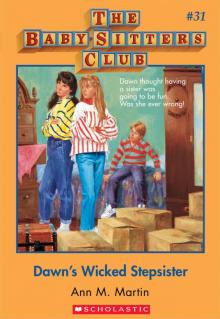 Dawn's Wicked Stepsister
Dawn's Wicked Stepsister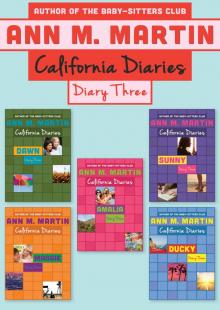 Diary Three: Dawn, Sunny, Maggie, Amalia, and Ducky
Diary Three: Dawn, Sunny, Maggie, Amalia, and Ducky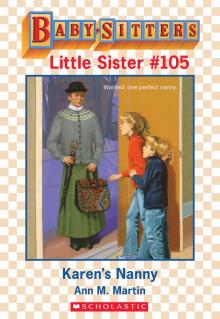 Karen's Nanny
Karen's Nanny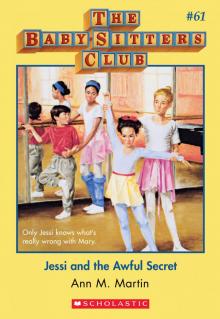 Jessi and the Awful Secret
Jessi and the Awful Secret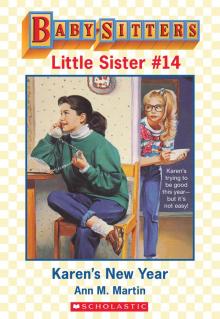 Karen's New Year
Karen's New Year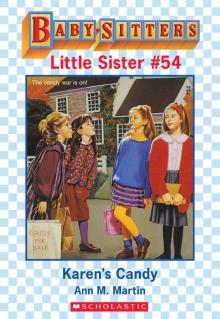 Karen's Candy
Karen's Candy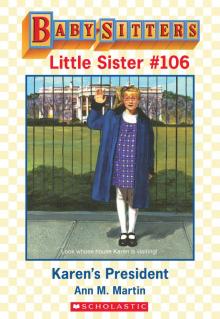 Karen's President
Karen's President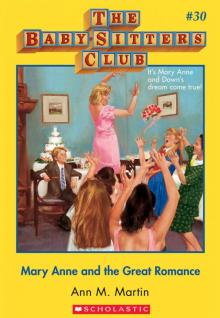 Mary Anne and the Great Romance
Mary Anne and the Great Romance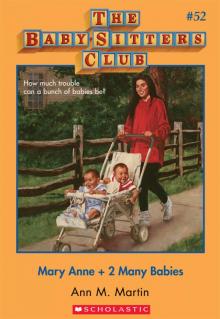 Mary Anne + 2 Many Babies
Mary Anne + 2 Many Babies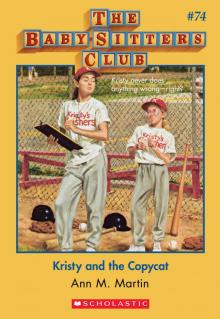 Kristy and the Copycat
Kristy and the Copycat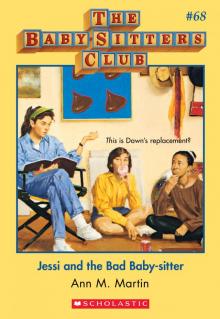 Jessi and the Bad Baby-Sitter
Jessi and the Bad Baby-Sitter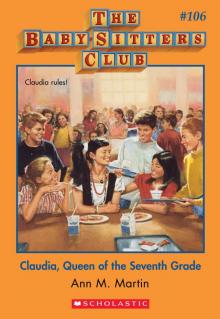 Claudia, Queen of the Seventh Grade
Claudia, Queen of the Seventh Grade Claudia and the Lighthouse Ghost
Claudia and the Lighthouse Ghost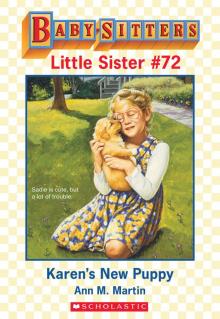 Karen's New Puppy
Karen's New Puppy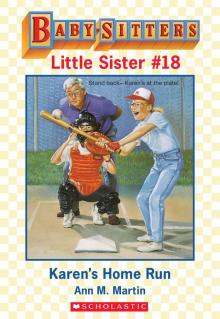 Karen's Home Run
Karen's Home Run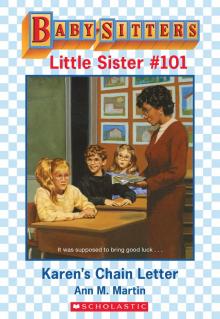 Karen's Chain Letter
Karen's Chain Letter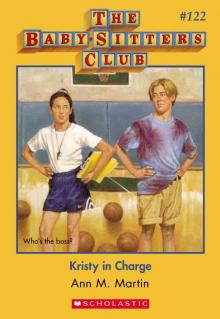 Kristy in Charge
Kristy in Charge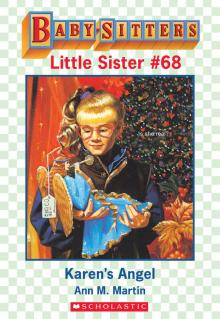 Karen's Angel
Karen's Angel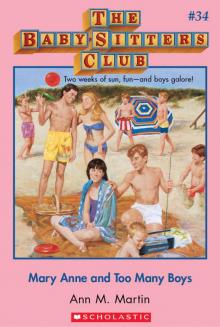 Mary Anne and Too Many Boys
Mary Anne and Too Many Boys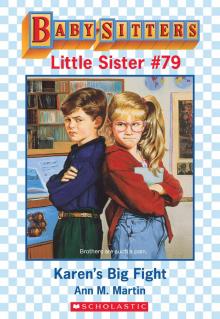 Karen's Big Fight
Karen's Big Fight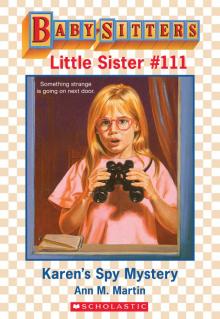 Karen's Spy Mystery
Karen's Spy Mystery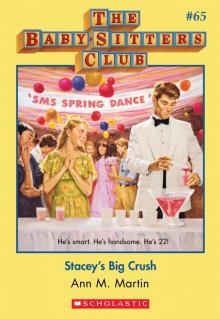 Stacey's Big Crush
Stacey's Big Crush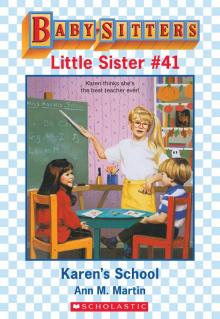 Karen's School
Karen's School Claudia and the Terrible Truth
Claudia and the Terrible Truth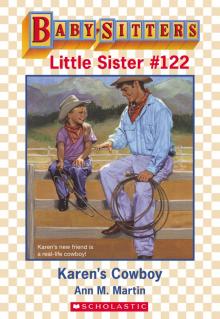 Karen's Cowboy
Karen's Cowboy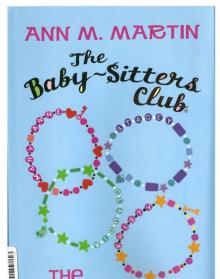 The Summer Before
The Summer Before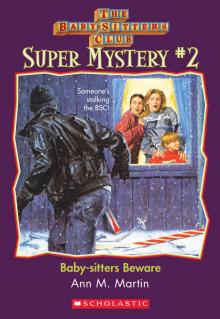 Beware, Dawn!
Beware, Dawn!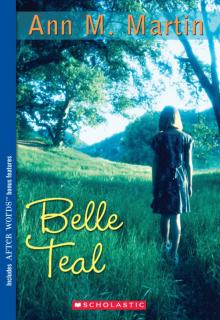 Belle Teale
Belle Teale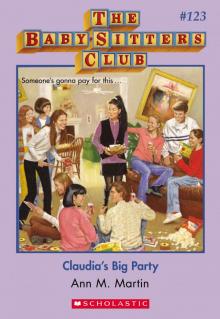 Claudia's Big Party
Claudia's Big Party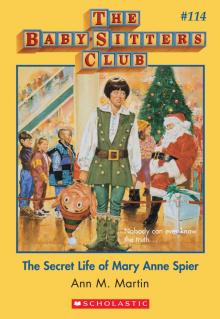 The Secret Life of Mary Anne Spier
The Secret Life of Mary Anne Spier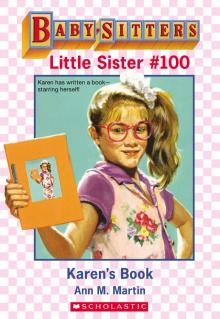 Karen's Book
Karen's Book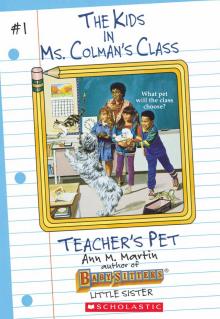 Teacher's Pet
Teacher's Pet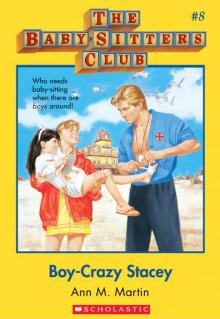 Boy-Crazy Stacey
Boy-Crazy Stacey Claudia and the Disaster Date
Claudia and the Disaster Date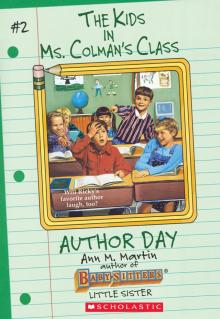 Author Day
Author Day Claudia and the Sad Good-Bye
Claudia and the Sad Good-Bye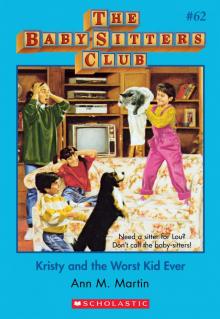 Kristy and the Worst Kid Ever
Kristy and the Worst Kid Ever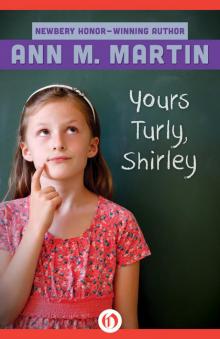 Yours Turly, Shirley
Yours Turly, Shirley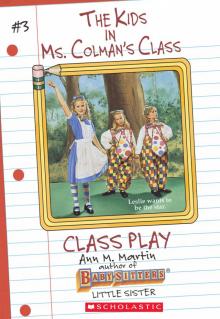 Class Play
Class Play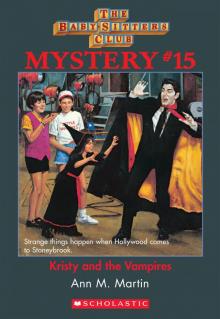 Kristy and the Vampires
Kristy and the Vampires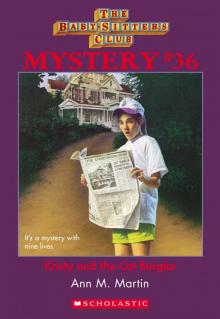 Kristy and the Cat Burglar
Kristy and the Cat Burglar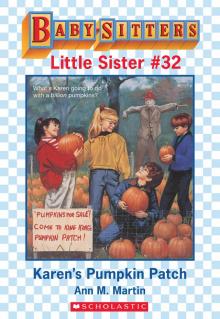 Karen's Pumpkin Patch
Karen's Pumpkin Patch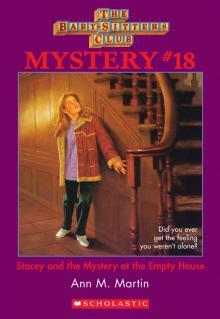 Stacey and the Mystery at the Empty House
Stacey and the Mystery at the Empty House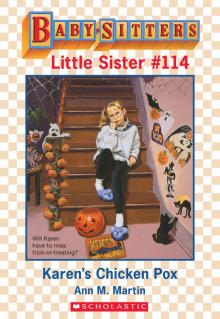 Karen's Chicken Pox
Karen's Chicken Pox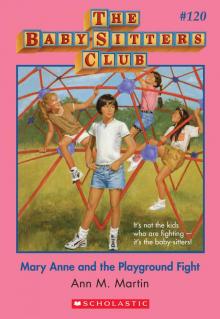 Mary Anne and the Playground Fight
Mary Anne and the Playground Fight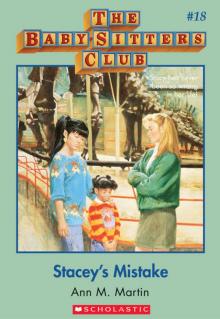 Stacey's Mistake
Stacey's Mistake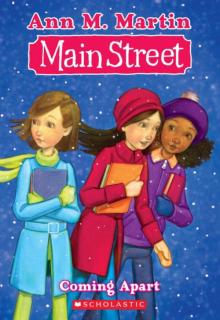 Coming Apart
Coming Apart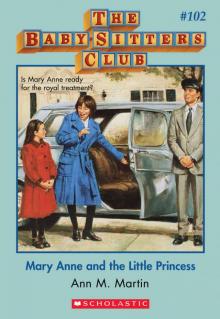 Mary Anne and the Little Princess
Mary Anne and the Little Princess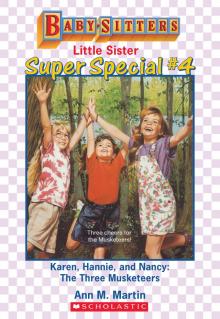 Karen, Hannie and Nancy: The Three Musketeers
Karen, Hannie and Nancy: The Three Musketeers 'Tis the Season
'Tis the Season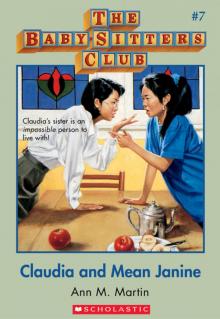 Claudia and Mean Janine
Claudia and Mean Janine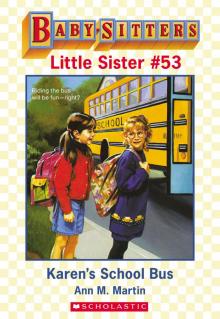 Karen's School Bus
Karen's School Bus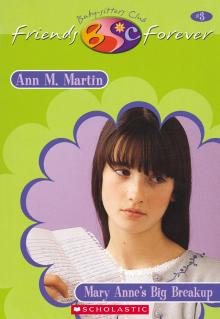 Mary Anne's Big Breakup
Mary Anne's Big Breakup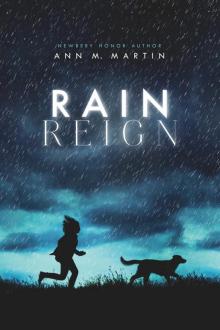 Rain Reign
Rain Reign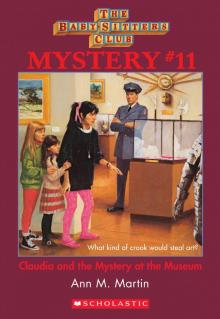 Claudia and the Mystery at the Museum
Claudia and the Mystery at the Museum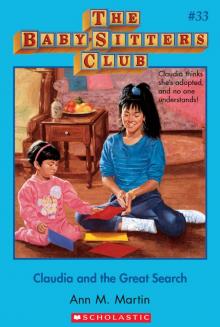 Claudia and the Great Search
Claudia and the Great Search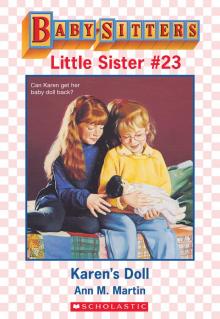 Karen's Doll
Karen's Doll Shannon's Story
Shannon's Story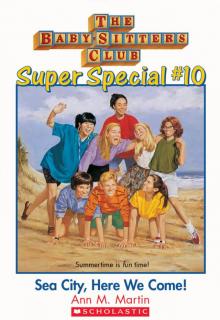 Sea City, Here We Come!
Sea City, Here We Come!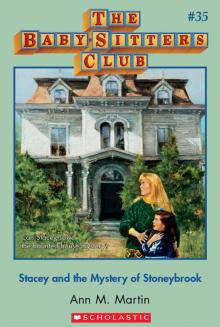 Stacey and the Mystery of Stoneybrook
Stacey and the Mystery of Stoneybrook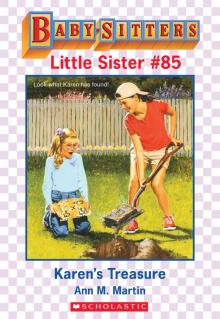 Karen's Treasure
Karen's Treasure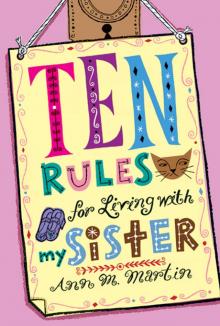 Ten Rules for Living With My Sister
Ten Rules for Living With My Sister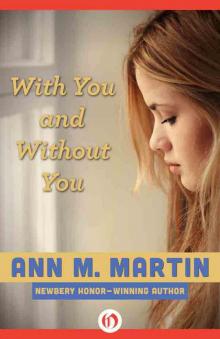 With You and Without You
With You and Without You Baby-Sitters' Island Adventure
Baby-Sitters' Island Adventure Karen's Fishing Trip
Karen's Fishing Trip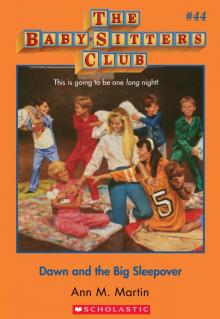 Dawn and the Big Sleepover
Dawn and the Big Sleepover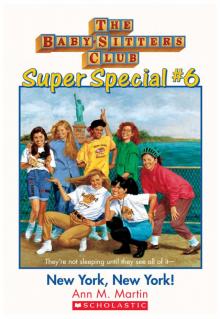 New York, New York!
New York, New York!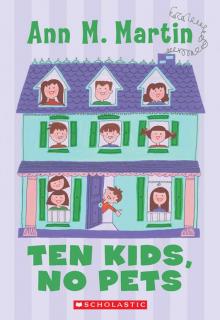 Ten Kids, No Pets
Ten Kids, No Pets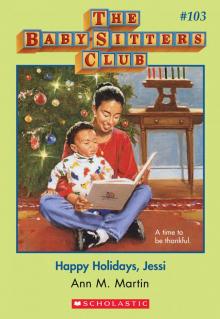 Happy Holidays, Jessi
Happy Holidays, Jessi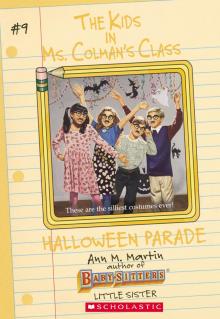 Halloween Parade
Halloween Parade Karen's New Holiday
Karen's New Holiday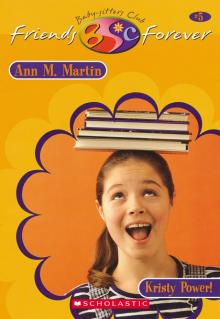 Kristy Power!
Kristy Power!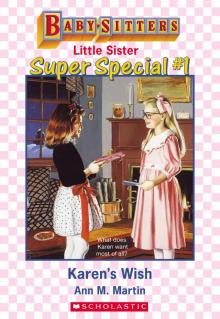 Karen's Wish
Karen's Wish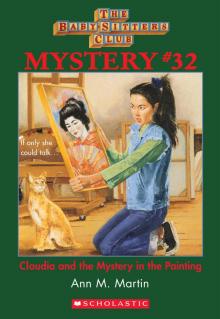 Claudia and the Mystery in the Painting
Claudia and the Mystery in the Painting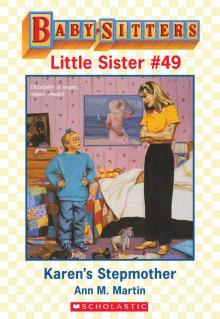 Karen's Stepmother
Karen's Stepmother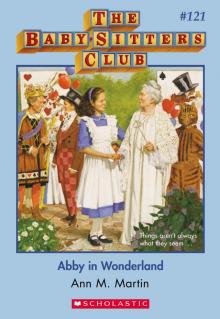 Abby in Wonderland
Abby in Wonderland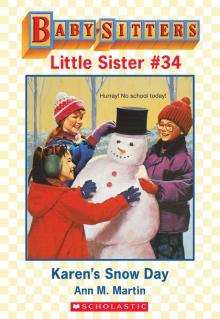 Karen's Snow Day
Karen's Snow Day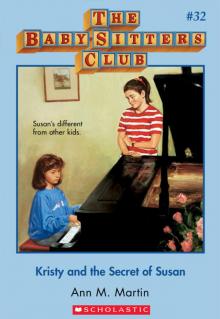 Kristy and the Secret of Susan
Kristy and the Secret of Susan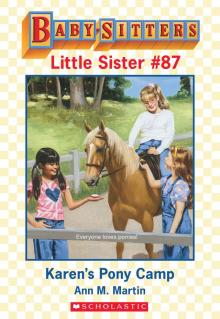 Karen's Pony Camp
Karen's Pony Camp Karen's School Trip
Karen's School Trip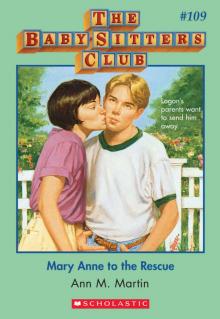 Mary Anne to the Rescue
Mary Anne to the Rescue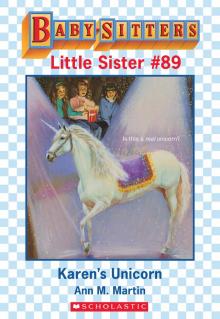 Karen's Unicorn
Karen's Unicorn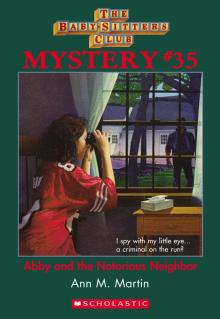 Abby and the Notorious Neighbor
Abby and the Notorious Neighbor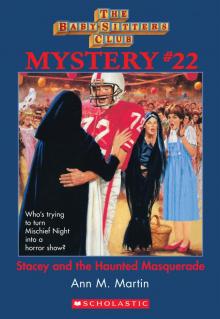 Stacey and the Haunted Masquerade
Stacey and the Haunted Masquerade Claudia Gets Her Guy
Claudia Gets Her Guy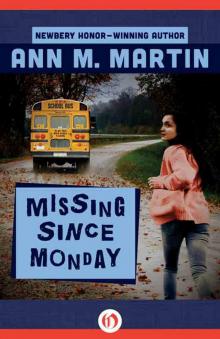 Missing Since Monday
Missing Since Monday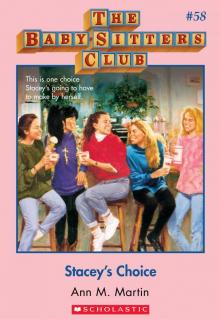 Stacey's Choice
Stacey's Choice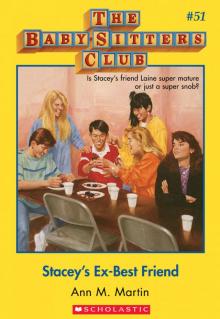 Stacey's Ex-Best Friend
Stacey's Ex-Best Friend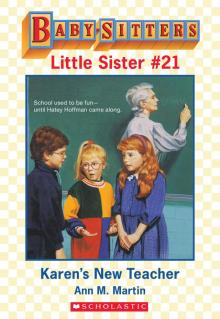 Karen's New Teacher
Karen's New Teacher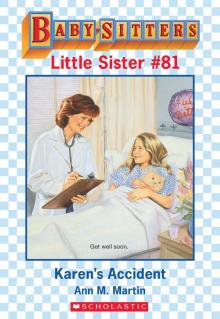 Karen's Accident
Karen's Accident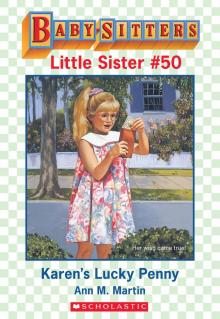 Karen's Lucky Penny
Karen's Lucky Penny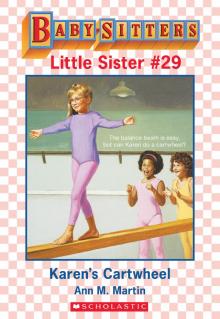 Karen's Cartwheel
Karen's Cartwheel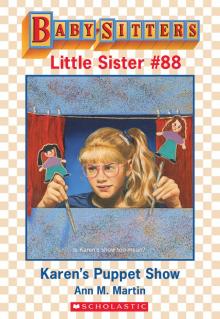 Karen's Puppet Show
Karen's Puppet Show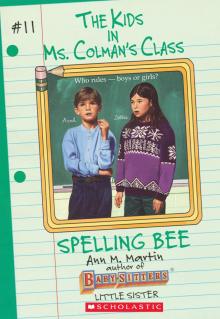 Spelling Bee
Spelling Bee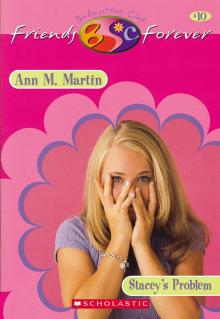 Stacey's Problem
Stacey's Problem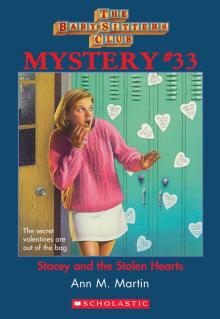 Stacey and the Stolen Hearts
Stacey and the Stolen Hearts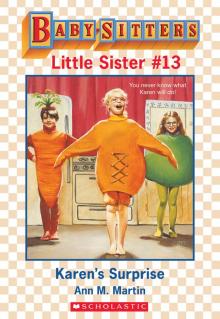 Karen's Surprise
Karen's Surprise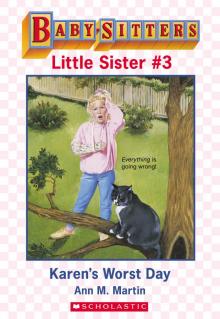 Karen's Worst Day
Karen's Worst Day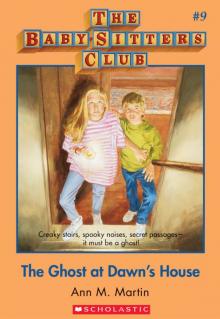 The Ghost at Dawn's House
The Ghost at Dawn's House Karen's Big Sister
Karen's Big Sister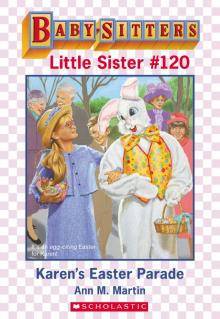 Karen's Easter Parade
Karen's Easter Parade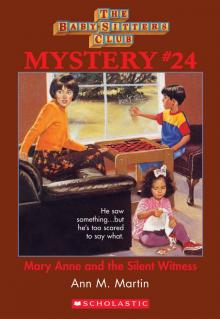 Mary Anne and the Silent Witness
Mary Anne and the Silent Witness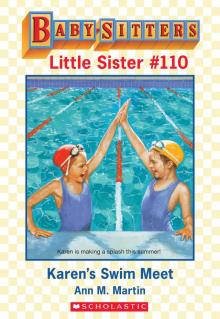 Karen's Swim Meet
Karen's Swim Meet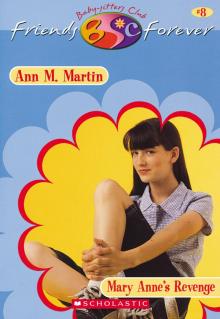 Mary Anne's Revenge
Mary Anne's Revenge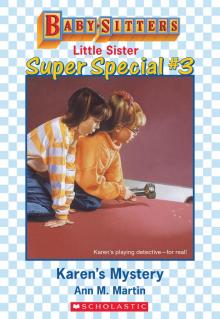 Karen's Mystery
Karen's Mystery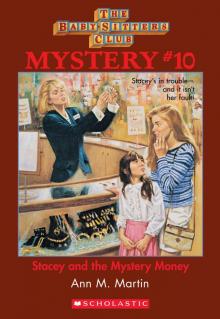 Stacey and the Mystery Money
Stacey and the Mystery Money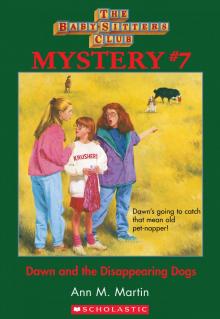 Dawn and the Disappearing Dogs
Dawn and the Disappearing Dogs Karen's Christmas Tree
Karen's Christmas Tree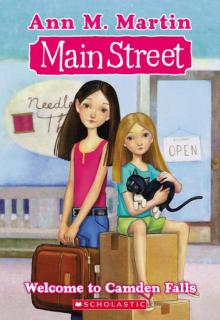 Welcome to Camden Falls
Welcome to Camden Falls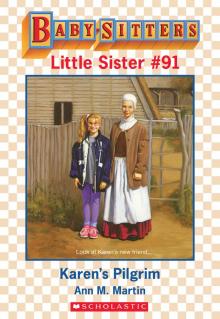 Karen's Pilgrim
Karen's Pilgrim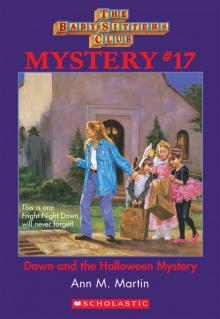 Dawn and the Halloween Mystery
Dawn and the Halloween Mystery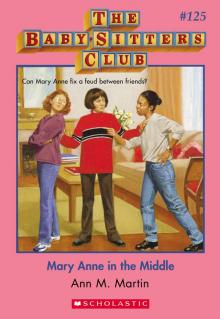 Mary Anne in the Middle
Mary Anne in the Middle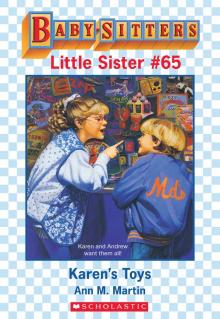 Karen's Toys
Karen's Toys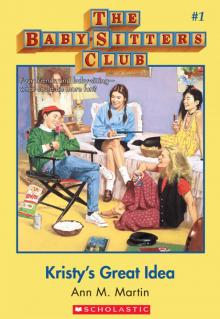 Kristy's Great Idea
Kristy's Great Idea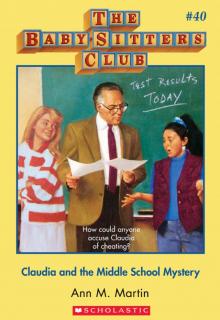 Claudia and the Middle School Mystery
Claudia and the Middle School Mystery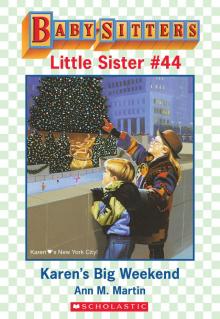 Karen's Big Weekend
Karen's Big Weekend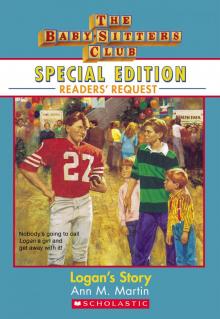 Logan's Story
Logan's Story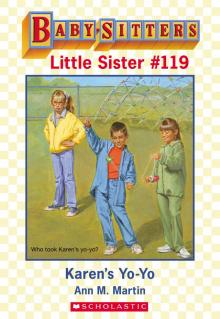 Karen's Yo-Yo
Karen's Yo-Yo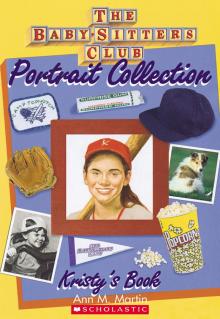 Kristy's Book
Kristy's Book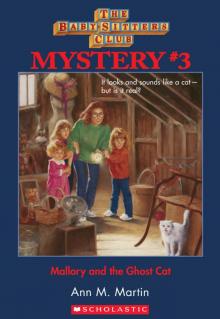 Mallory and the Ghost Cat
Mallory and the Ghost Cat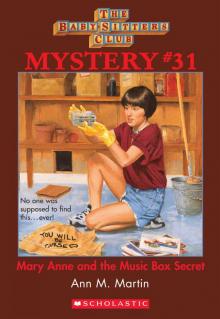 Mary Anne and the Music
Mary Anne and the Music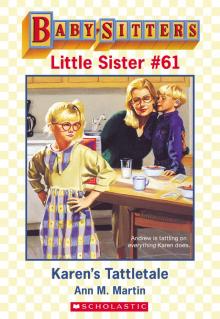 Karen's Tattletale
Karen's Tattletale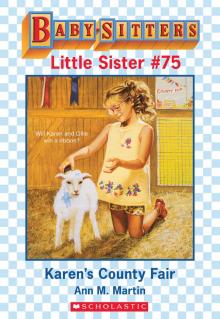 Karen's County Fair
Karen's County Fair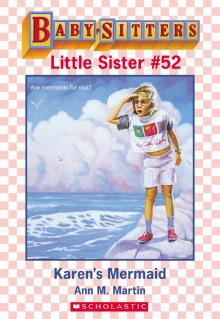 Karen's Mermaid
Karen's Mermaid Snowbound
Snowbound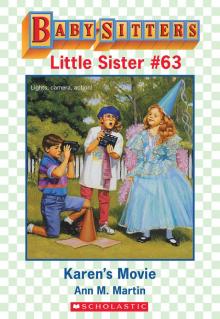 Karen's Movie
Karen's Movie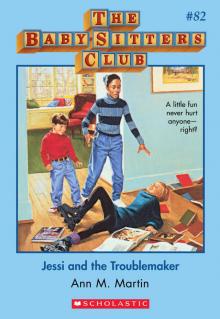 Jessi and the Troublemaker
Jessi and the Troublemaker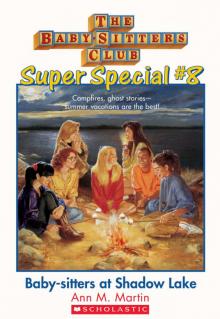 Baby-Sitters at Shadow Lake
Baby-Sitters at Shadow Lake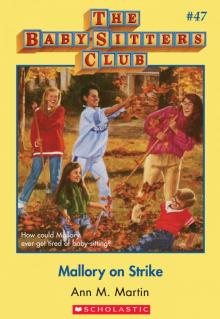 Mallory on Strike
Mallory on Strike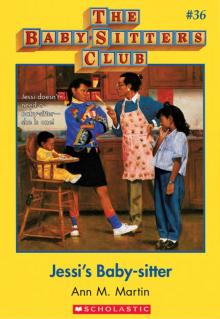 Jessi's Baby-Sitter
Jessi's Baby-Sitter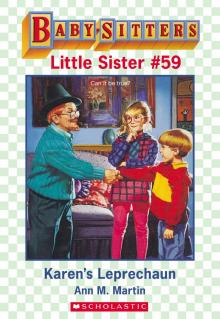 Karen's Leprechaun
Karen's Leprechaun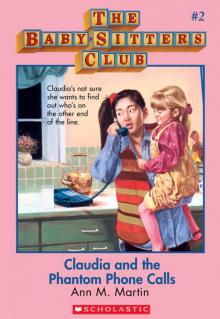 Claudia and the Phantom Phone Calls
Claudia and the Phantom Phone Calls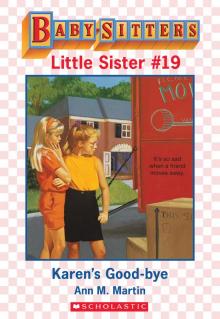 Karen's Good-Bye
Karen's Good-Bye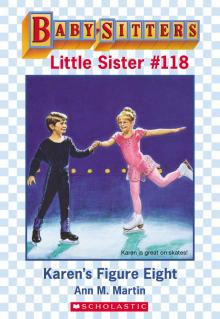 Karen's Figure Eight
Karen's Figure Eight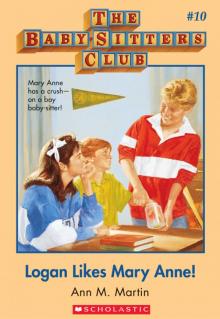 Logan Likes Mary Anne!
Logan Likes Mary Anne!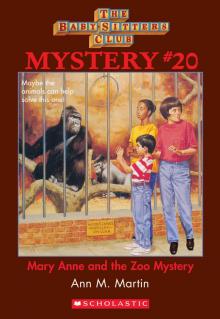 Mary Anne and the Zoo Mystery
Mary Anne and the Zoo Mystery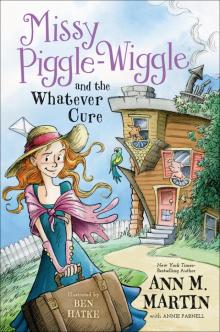 Missy Piggle-Wiggle and the Whatever Cure
Missy Piggle-Wiggle and the Whatever Cure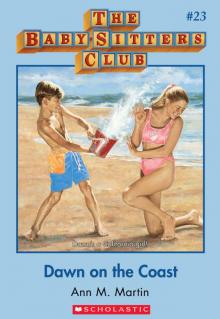 Dawn on the Coast
Dawn on the Coast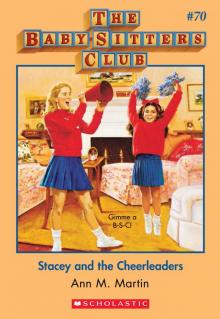 Stacey and the Cheerleaders
Stacey and the Cheerleaders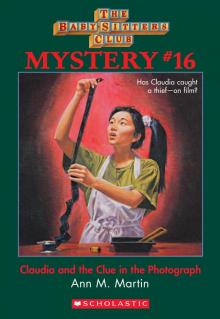 Claudia and the Clue in the Photograph
Claudia and the Clue in the Photograph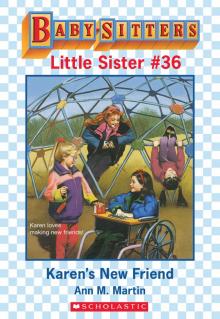 Karen's New Friend
Karen's New Friend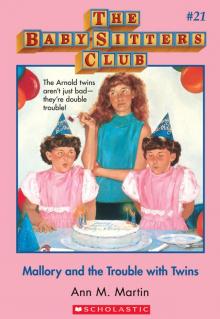 Mallory and the Trouble With Twins
Mallory and the Trouble With Twins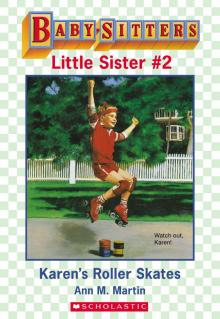 Karen's Roller Skates
Karen's Roller Skates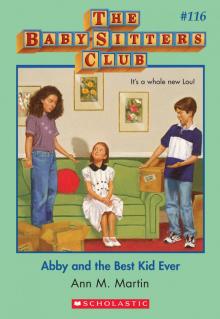 Abby and the Best Kid Ever
Abby and the Best Kid Ever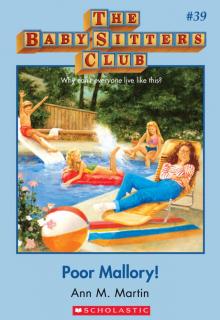 Poor Mallory!
Poor Mallory!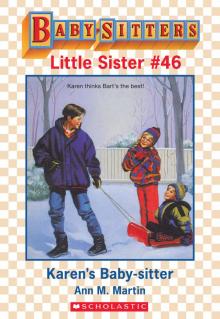 Karen's Witch
Karen's Witch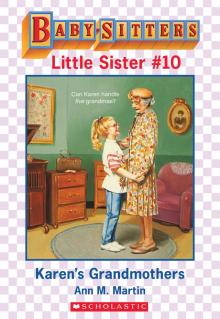 Karen's Grandmothers
Karen's Grandmothers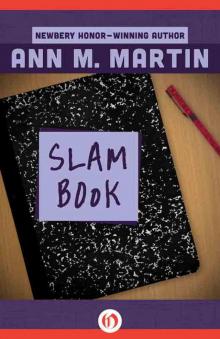 Slam Book
Slam Book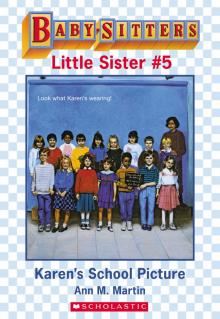 Karen's School Picture
Karen's School Picture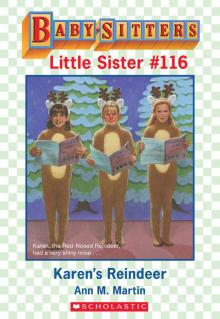 Karen's Reindeer
Karen's Reindeer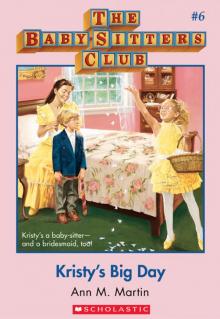 Kristy's Big Day
Kristy's Big Day The Long Way Home
The Long Way Home Karen's Sleigh Ride
Karen's Sleigh Ride On Christmas Eve
On Christmas Eve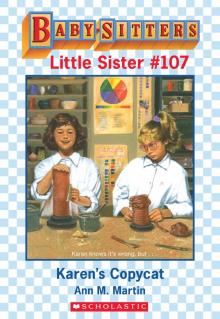 Karen's Copycat
Karen's Copycat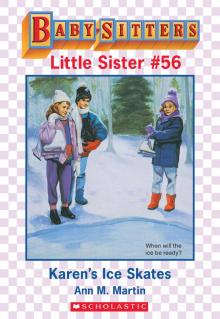 Karen's Ice Skates
Karen's Ice Skates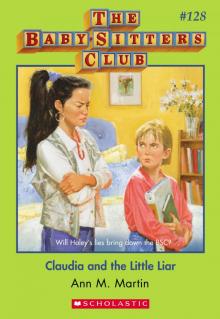 Claudia and the Little Liar
Claudia and the Little Liar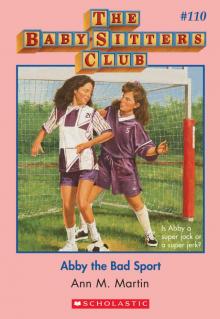 Abby the Bad Sport
Abby the Bad Sport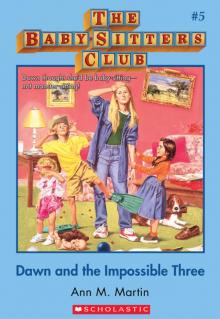 The Baby-Sitters Club #5: Dawn and the Impossible Three
The Baby-Sitters Club #5: Dawn and the Impossible Three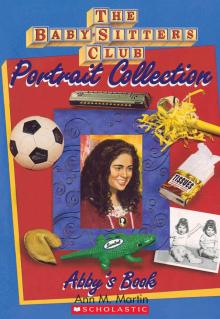 Abby's Book
Abby's Book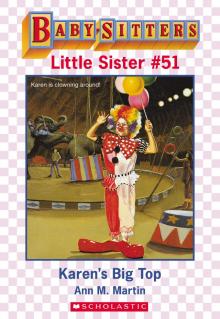 Karen's Big Top
Karen's Big Top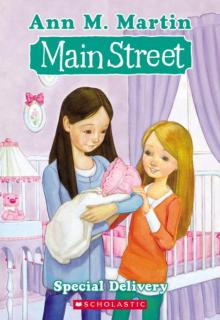 Main Street #8: Special Delivery
Main Street #8: Special Delivery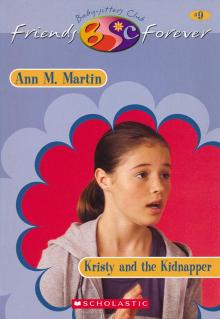 Kristy and the Kidnapper
Kristy and the Kidnapper Karen's Ski Trip
Karen's Ski Trip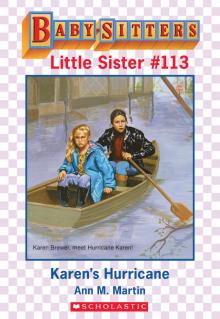 Karen's Hurricane
Karen's Hurricane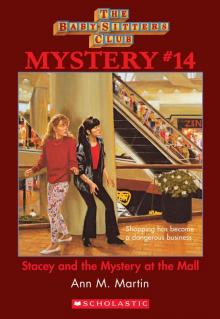 Stacey and the Mystery at the Mall
Stacey and the Mystery at the Mall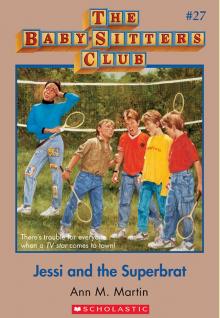 Jessi and the Superbrat
Jessi and the Superbrat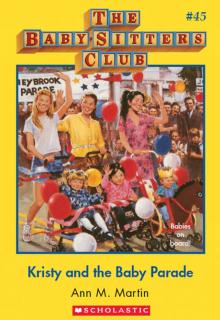 Kristy and the Baby Parade
Kristy and the Baby Parade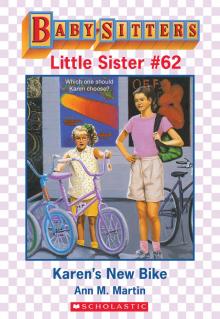 Karen's New Bike
Karen's New Bike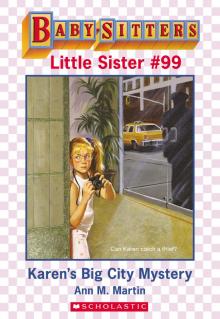 Karen's Big City Mystery
Karen's Big City Mystery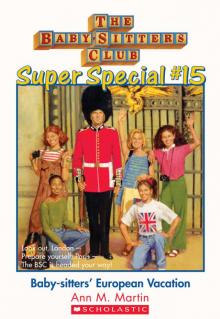 Baby-Sitters' European Vacation
Baby-Sitters' European Vacation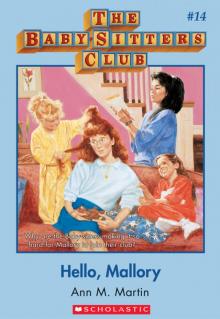 Hello, Mallory
Hello, Mallory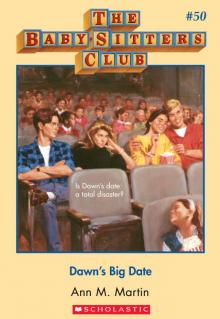 Dawn's Big Date
Dawn's Big Date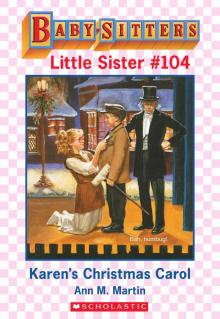 Karen's Christmas Carol
Karen's Christmas Carol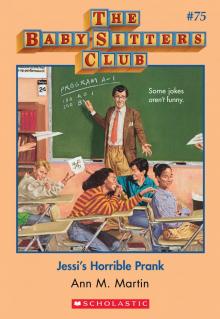 Jessi's Horrible Prank
Jessi's Horrible Prank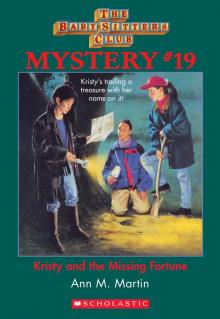 Kristy and the Missing Fortune
Kristy and the Missing Fortune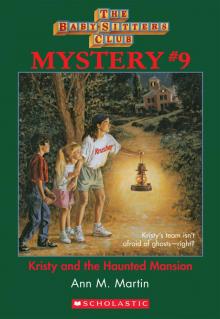 Kristy and the Haunted Mansion
Kristy and the Haunted Mansion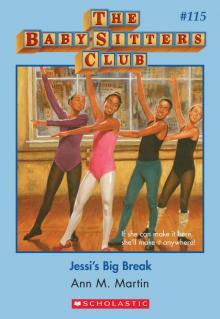 Jessi's Big Break
Jessi's Big Break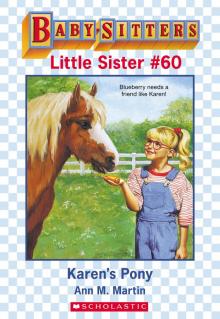 Karen's Pony
Karen's Pony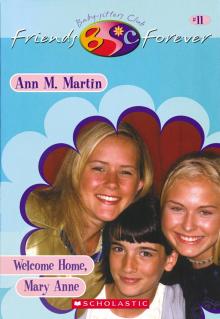 Welcome Home, Mary Anne
Welcome Home, Mary Anne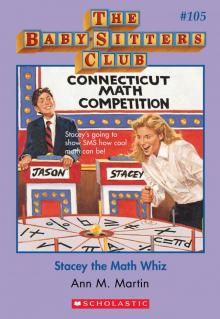 Stacey the Math Whiz
Stacey the Math Whiz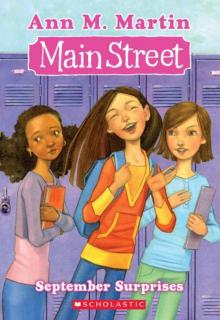 September Surprises
September Surprises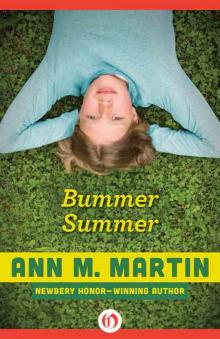 Bummer Summer
Bummer Summer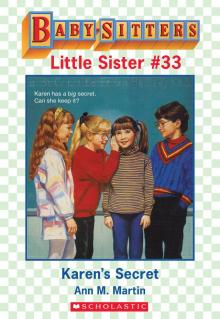 Karen's Secret
Karen's Secret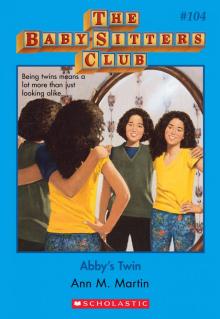 Abby's Twin
Abby's Twin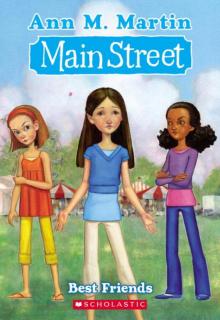 Main Street #4: Best Friends
Main Street #4: Best Friends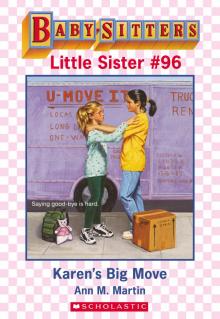 Karen's Big Move
Karen's Big Move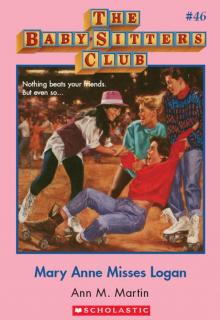 Mary Anne Misses Logan
Mary Anne Misses Logan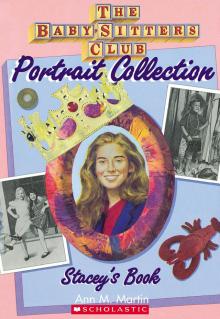 Stacey's Book
Stacey's Book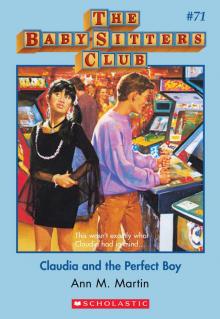 Claudia and the Perfect Boy
Claudia and the Perfect Boy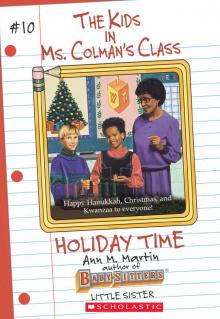 Holiday Time
Holiday Time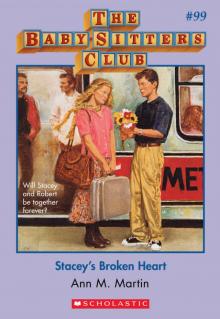 Stacey's Broken Heart
Stacey's Broken Heart Karen's Field Day
Karen's Field Day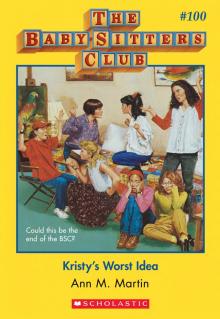 Kristy's Worst Idea
Kristy's Worst Idea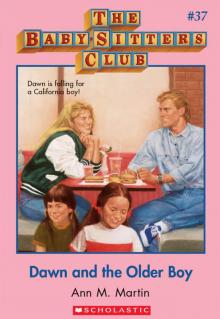 Dawn and the Older Boy
Dawn and the Older Boy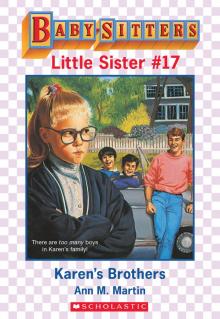 Karen's Brothers
Karen's Brothers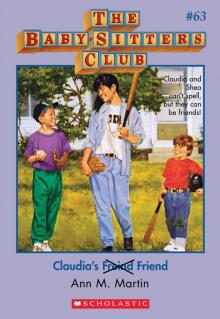 Claudia's Friend
Claudia's Friend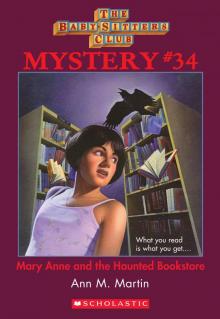 Mary Anne and the Haunted Bookstore
Mary Anne and the Haunted Bookstore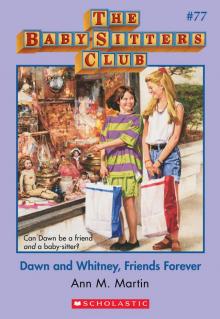 Dawn and Whitney, Friends Forever
Dawn and Whitney, Friends Forever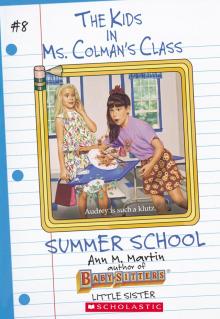 Summer School
Summer School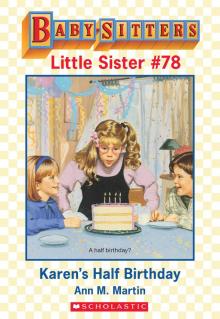 Karen's Birthday
Karen's Birthday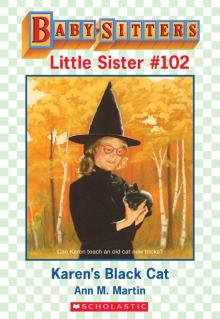 Karen's Black Cat
Karen's Black Cat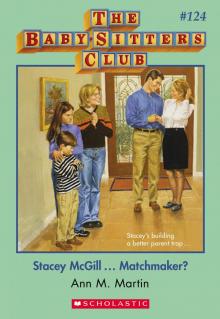 Stacey McGill... Matchmaker?
Stacey McGill... Matchmaker?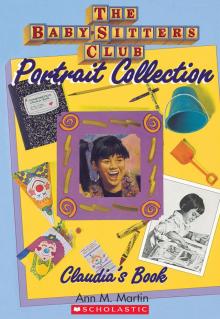 Claudia's Book
Claudia's Book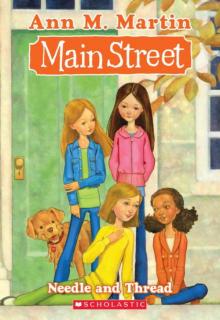 Main Street #2: Needle and Thread
Main Street #2: Needle and Thread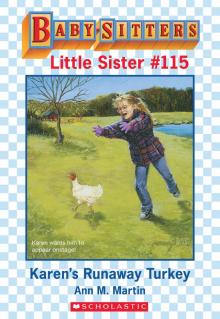 Karen's Runaway Turkey
Karen's Runaway Turkey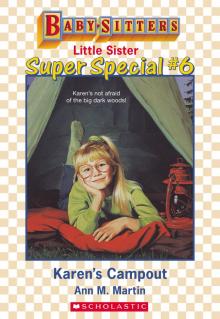 Karen's Campout
Karen's Campout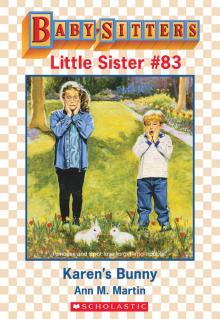 Karen's Bunny
Karen's Bunny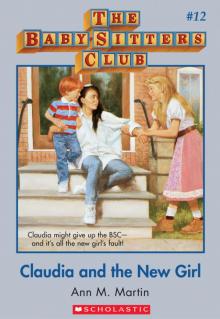 Claudia and the New Girl
Claudia and the New Girl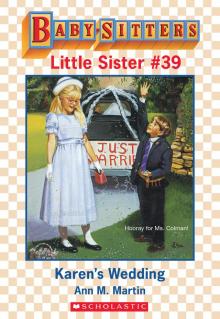 Karen's Wedding
Karen's Wedding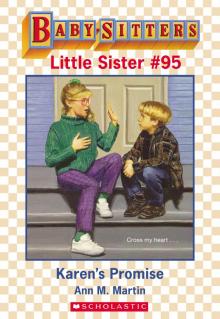 Karen's Promise
Karen's Promise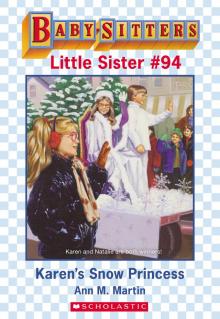 Karen's Snow Princess
Karen's Snow Princess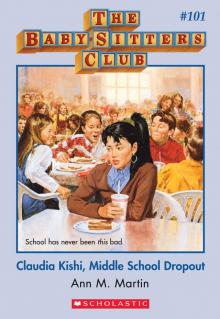 Claudia Kishi, Middle School Dropout
Claudia Kishi, Middle School Dropout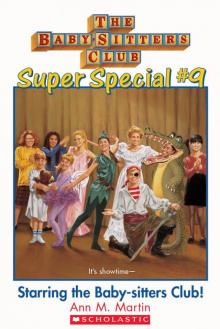 Starring the Baby-Sitters Club!
Starring the Baby-Sitters Club!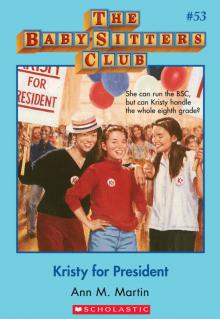 Kristy for President
Kristy for President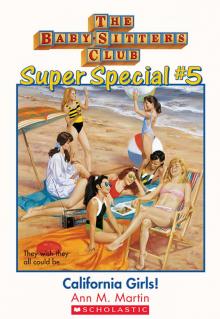 California Girls!
California Girls!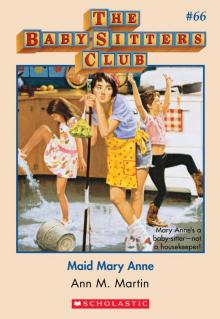 Maid Mary Anne
Maid Mary Anne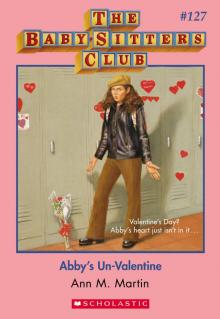 Abby's Un-Valentine
Abby's Un-Valentine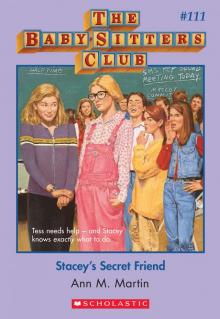 Stacey's Secret Friend
Stacey's Secret Friend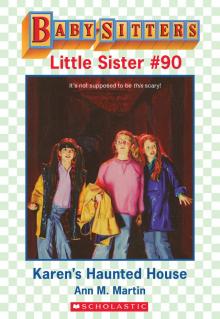 Karen's Haunted House
Karen's Haunted House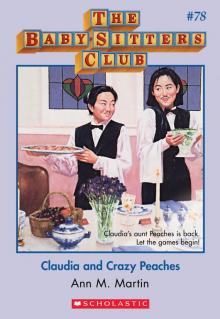 Claudia and Crazy Peaches
Claudia and Crazy Peaches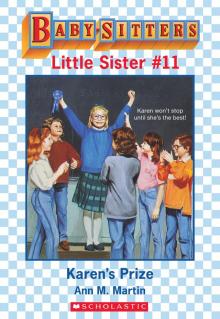 Karen's Prize
Karen's Prize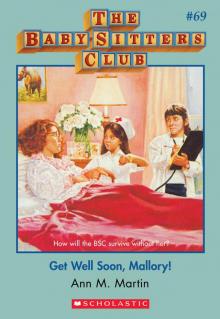 Get Well Soon, Mallory!
Get Well Soon, Mallory!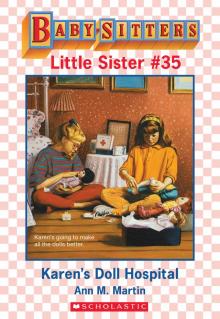 Karen's Doll Hospital
Karen's Doll Hospital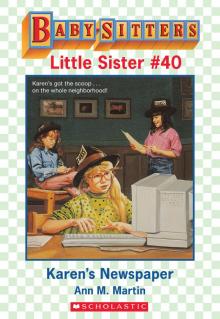 Karen's Newspaper
Karen's Newspaper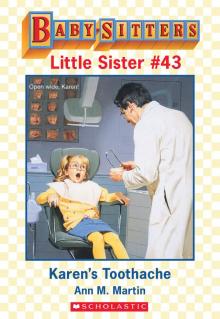 Karen's Toothache
Karen's Toothache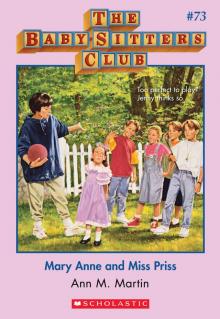 Mary Anne and Miss Priss
Mary Anne and Miss Priss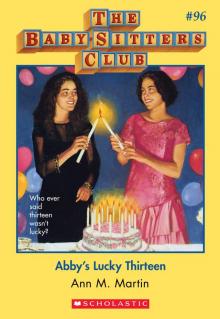 Abby's Lucky Thirteen
Abby's Lucky Thirteen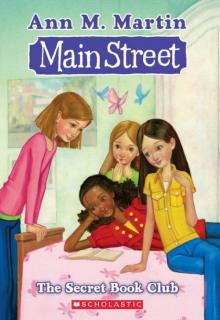 The Secret Book Club
The Secret Book Club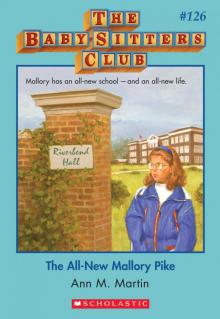 The All-New Mallory Pike
The All-New Mallory Pike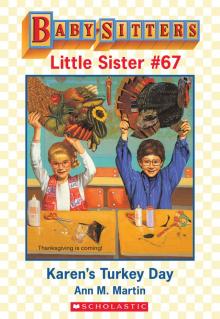 Karen's Turkey Day
Karen's Turkey Day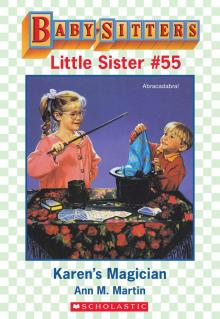 Karen's Magician
Karen's Magician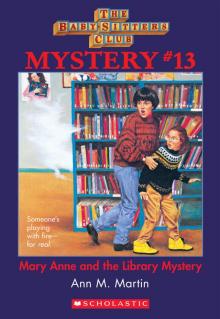 Mary Anne and the Library Mystery
Mary Anne and the Library Mystery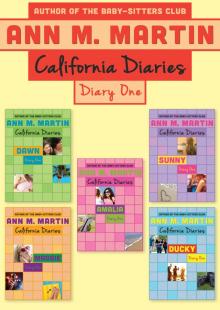 Diary One: Dawn, Sunny, Maggie, Amalia, and Ducky
Diary One: Dawn, Sunny, Maggie, Amalia, and Ducky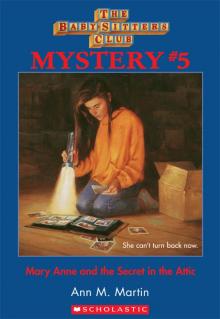 Mary Anne and the Secret in the Attic
Mary Anne and the Secret in the Attic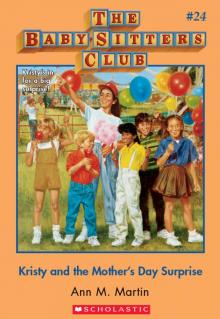 Kristy and the Mother's Day Surprise
Kristy and the Mother's Day Surprise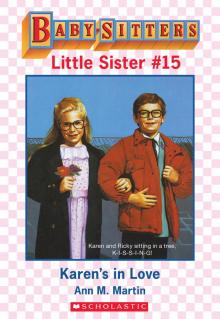 Karen's in Love
Karen's in Love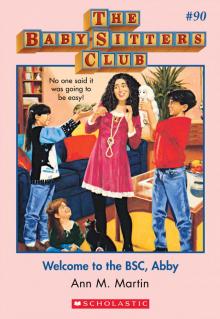 Welcome to the BSC, Abby
Welcome to the BSC, Abby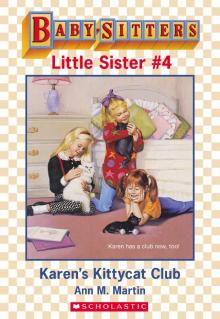 Karen's Kittycat Club
Karen's Kittycat Club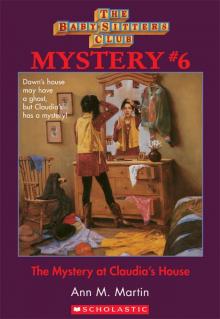 The Mystery at Claudia's House
The Mystery at Claudia's House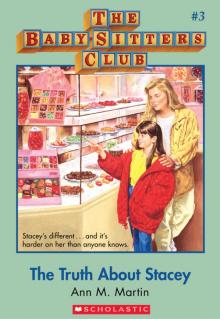 The Truth About Stacey
The Truth About Stacey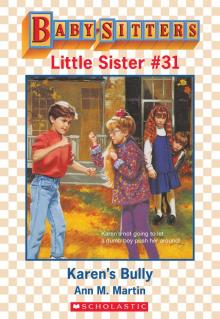 Karen's Bully
Karen's Bully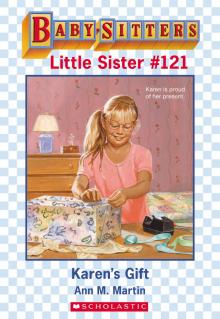 Karen's Gift
Karen's Gift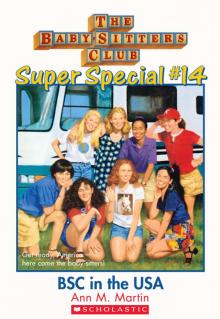 BSC in the USA
BSC in the USA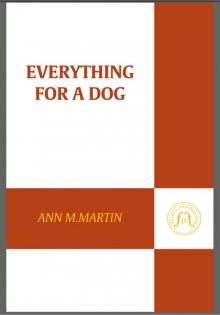 Everything for a Dog
Everything for a Dog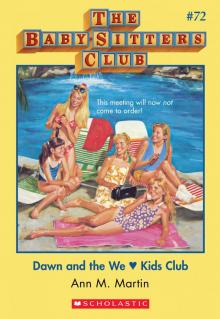 Dawn and the We Love Kids Club
Dawn and the We Love Kids Club Karen's Ghost
Karen's Ghost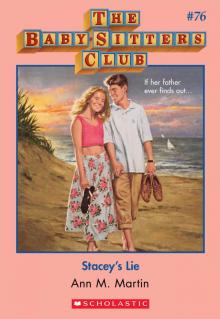 Stacey's Lie
Stacey's Lie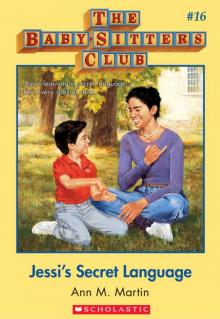 Jessi's Secret Language
Jessi's Secret Language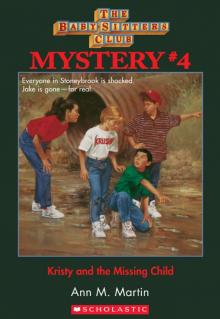 Kristy and the Missing Child
Kristy and the Missing Child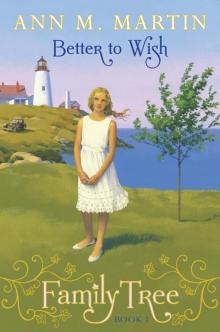 Better to Wish
Better to Wish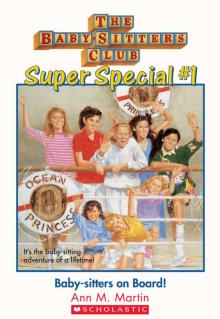 Baby-Sitters on Board!
Baby-Sitters on Board!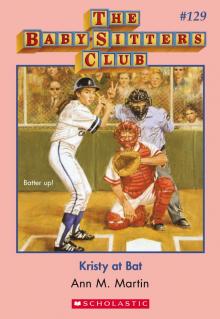 Kristy at Bat
Kristy at Bat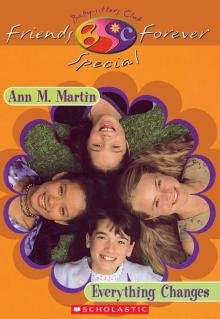 Everything Changes
Everything Changes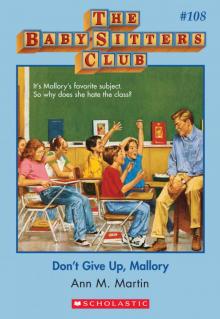 Don't Give Up, Mallory
Don't Give Up, Mallory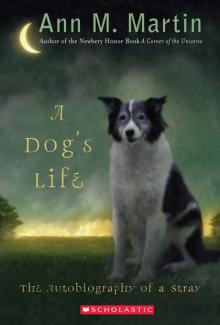 A Dog's Life: The Autobiography of a Stray
A Dog's Life: The Autobiography of a Stray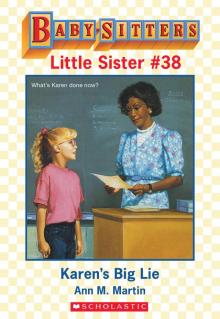 Karen's Big Lie
Karen's Big Lie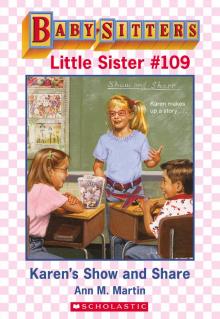 Karen's Show and Share
Karen's Show and Share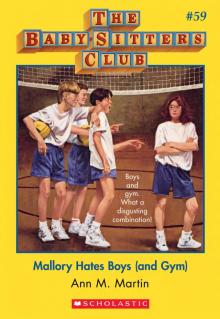 Mallory Hates Boys (and Gym)
Mallory Hates Boys (and Gym)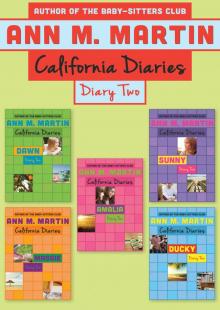 Diary Two: Dawn, Sunny, Maggie, Amalia, and Ducky
Diary Two: Dawn, Sunny, Maggie, Amalia, and Ducky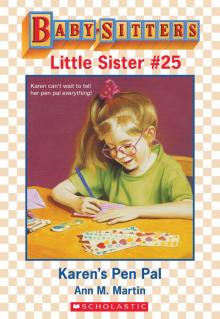 Karen's Pen Pal
Karen's Pen Pal Claudia and the Friendship Feud
Claudia and the Friendship Feud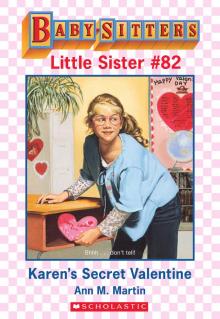 Karen's Secret Valentine
Karen's Secret Valentine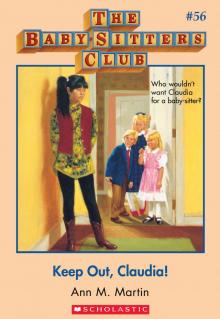 Keep Out, Claudia!
Keep Out, Claudia! Aloha, Baby-Sitters!
Aloha, Baby-Sitters!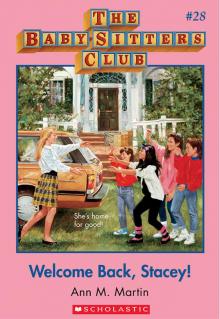 Welcome Back, Stacey
Welcome Back, Stacey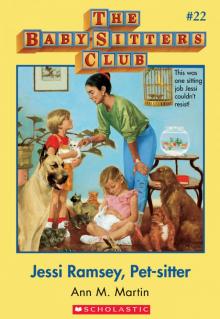 Jessi Ramsey, Pet-Sitter
Jessi Ramsey, Pet-Sitter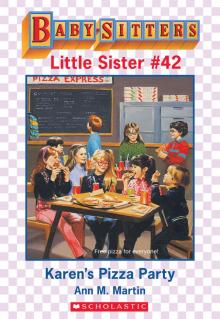 Karen's Pizza Party
Karen's Pizza Party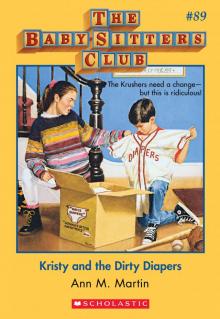 Kristy and the Dirty Diapers
Kristy and the Dirty Diapers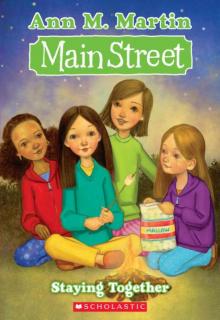 Staying Together
Staying Together Dawn and the Surfer Ghost
Dawn and the Surfer Ghost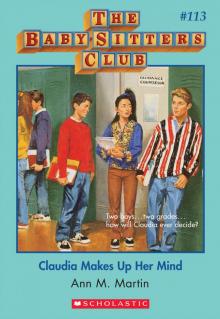 Claudia Makes Up Her Mind
Claudia Makes Up Her Mind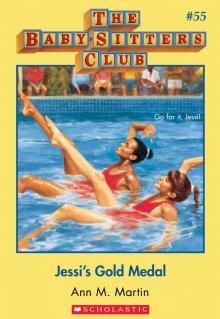 Jessi's Gold Medal
Jessi's Gold Medal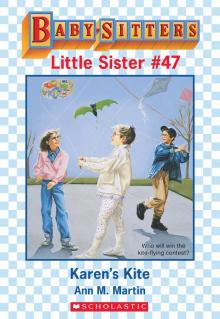 Karen's Kite
Karen's Kite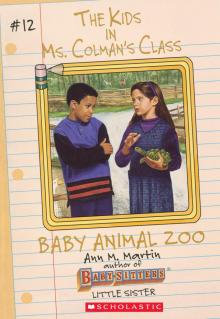 Baby Animal Zoo
Baby Animal Zoo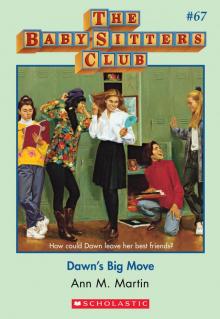 Dawn's Big Move
Dawn's Big Move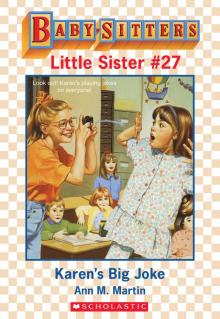 Karen's Big Joke
Karen's Big Joke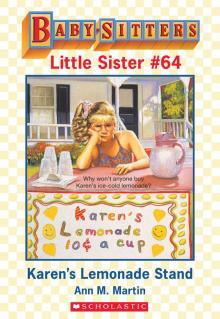 Karen's Lemonade Stand
Karen's Lemonade Stand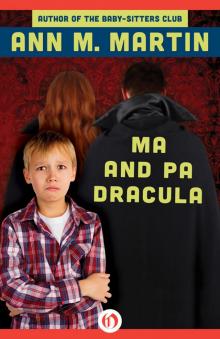 Ma and Pa Dracula
Ma and Pa Dracula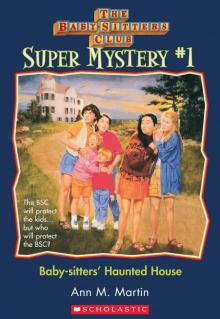 Baby-Sitters' Haunted House
Baby-Sitters' Haunted House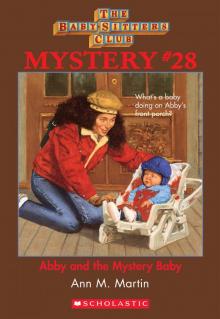 Abby and the Mystery Baby
Abby and the Mystery Baby Home Is the Place
Home Is the Place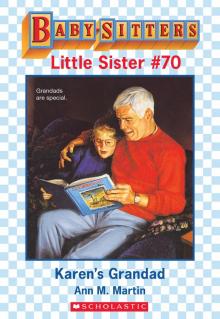 Karen's Grandad
Karen's Grandad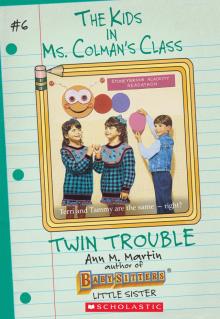 Twin Trouble
Twin Trouble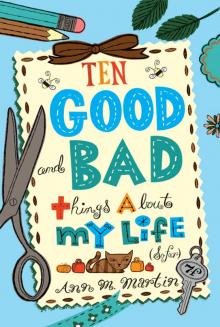 Ten Good and Bad Things About My Life (So Far)
Ten Good and Bad Things About My Life (So Far)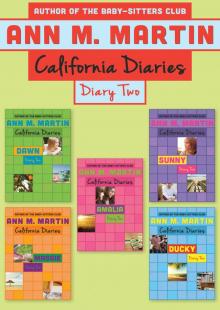 Diary Two
Diary Two Baby-Sitters Club 027
Baby-Sitters Club 027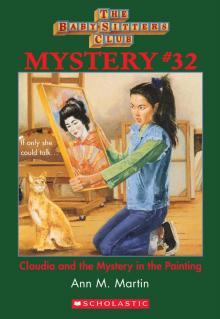 Claudia and the Mystery Painting
Claudia and the Mystery Painting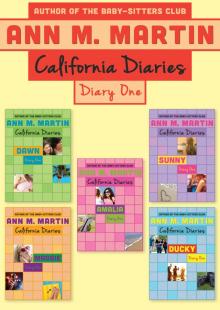 Diary One
Diary One Baby-Sitters Club 037
Baby-Sitters Club 037 Baby-Sitters Club 028
Baby-Sitters Club 028 Baby-Sitters Club 085
Baby-Sitters Club 085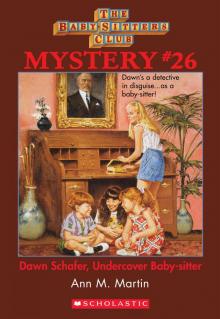 Dawn Schaffer Undercover Baby-Sitter
Dawn Schaffer Undercover Baby-Sitter Jessi's Babysitter
Jessi's Babysitter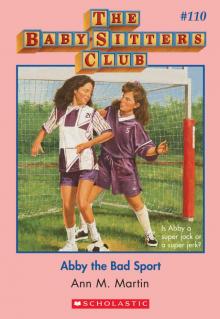 The Baby-Sitters Club #110: Abby the Bad Sport (Baby-Sitters Club, The)
The Baby-Sitters Club #110: Abby the Bad Sport (Baby-Sitters Club, The) Karen's Little Sister
Karen's Little Sister Baby-Sitters Club 058
Baby-Sitters Club 058 Claudia And The Genius On Elm St.
Claudia And The Genius On Elm St.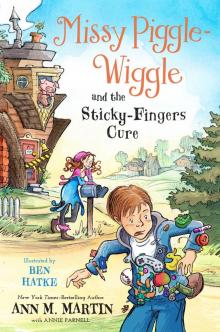 Missy Piggle-Wiggle and the Sticky-Fingers Cure
Missy Piggle-Wiggle and the Sticky-Fingers Cure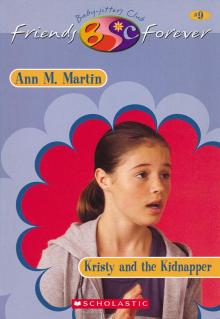 Kristy and Kidnapper
Kristy and Kidnapper Baby-Sitters Club 041
Baby-Sitters Club 041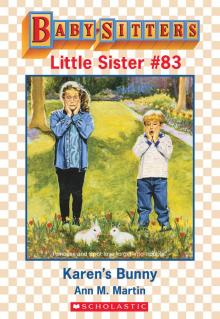 Karen's Bunny Trouble
Karen's Bunny Trouble Baby-Sitters Club 032
Baby-Sitters Club 032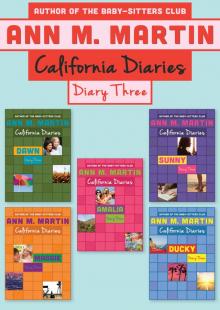 Diary Three
Diary Three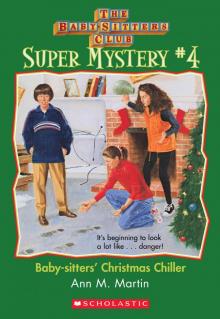 Christmas Chiller
Christmas Chiller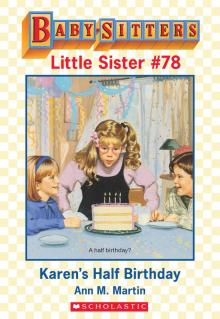 Karen's Half-Birthday
Karen's Half-Birthday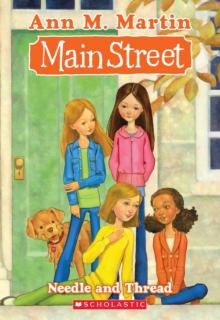 Needle and Thread
Needle and Thread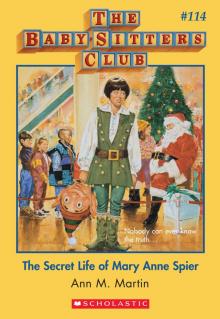 Secret Life of Mary Anne Spier
Secret Life of Mary Anne Spier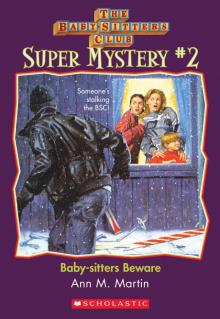 Baby-Sitters Beware
Baby-Sitters Beware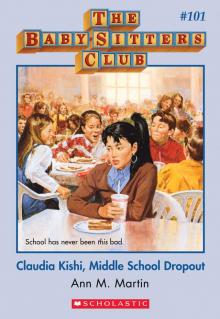 Claudia Kishi, Middle School Drop-Out
Claudia Kishi, Middle School Drop-Out Logan Likes Mary Anne !
Logan Likes Mary Anne ! Baby-Sitters Club 061
Baby-Sitters Club 061 Best Friends
Best Friends Baby-Sitters Club 031
Baby-Sitters Club 031 Karen's Little Witch
Karen's Little Witch Jessi Ramsey, Petsitter
Jessi Ramsey, Petsitter Baby-Sitters Club 123
Baby-Sitters Club 123 Baby-Sitters Club 059
Baby-Sitters Club 059 Baby-Sitters Club 033
Baby-Sitters Club 033 Baby-Sitters Club 060
Baby-Sitters Club 060 Baby-Sitters Club 094
Baby-Sitters Club 094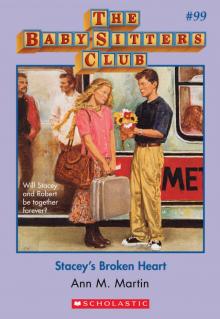 The Baby-Sitters Club #99: Stacey's Broken Heart
The Baby-Sitters Club #99: Stacey's Broken Heart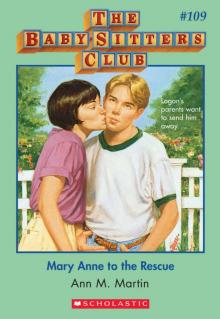 The Baby-Sitters Club #109: Mary Anne to the Rescue (Baby-Sitters Club, The)
The Baby-Sitters Club #109: Mary Anne to the Rescue (Baby-Sitters Club, The) Mystery At Claudia's House
Mystery At Claudia's House Claudia And The Sad Goodbye
Claudia And The Sad Goodbye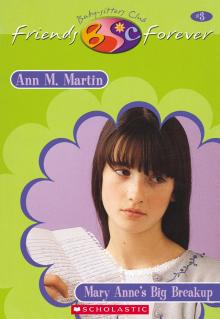 Mary Anne's Big Break-Up
Mary Anne's Big Break-Up Baby-Sitters Club 025
Baby-Sitters Club 025 Baby-Sitters Club 042
Baby-Sitters Club 042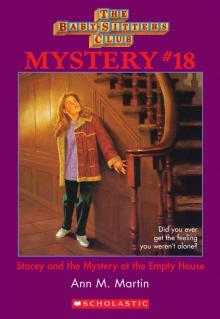 Stacey and the Mystery of the Empty House
Stacey and the Mystery of the Empty House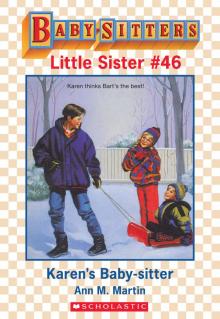 Karen's Baby-Sitter
Karen's Baby-Sitter Claudia's Friendship Feud
Claudia's Friendship Feud Baby-Sitters Club 090
Baby-Sitters Club 090 Baby-Sitters Club 021
Baby-Sitters Club 021 Baby-Sitters Club 056
Baby-Sitters Club 056 Baby-Sitters Club 040
Baby-Sitters Club 040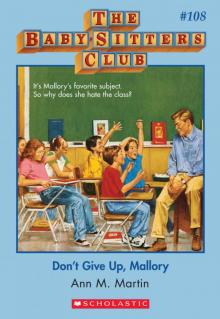 The Baby-Sitters Club #108: Don't Give Up, Mallory (Baby-Sitters Club, The)
The Baby-Sitters Club #108: Don't Give Up, Mallory (Baby-Sitters Club, The)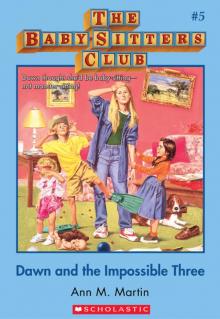 Dawn and the Impossible Three
Dawn and the Impossible Three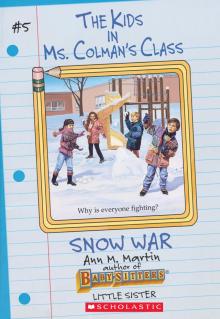 The Snow War
The Snow War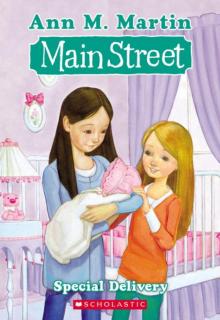 Special Delivery
Special Delivery Baby-Sitters Club 057
Baby-Sitters Club 057 Mary Anne And Too Many Babies
Mary Anne And Too Many Babies Baby-Sitters Club 030
Baby-Sitters Club 030